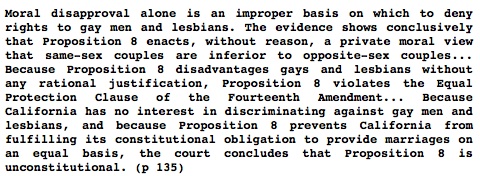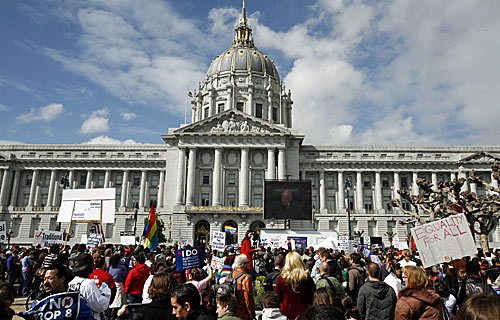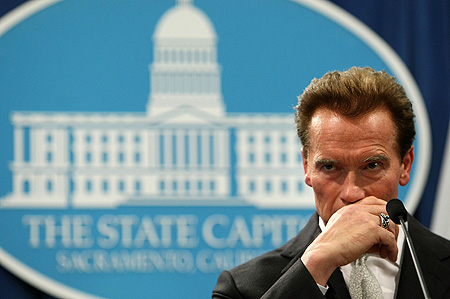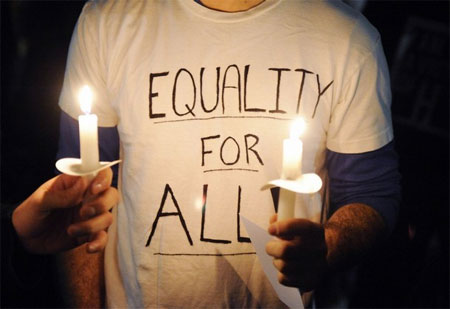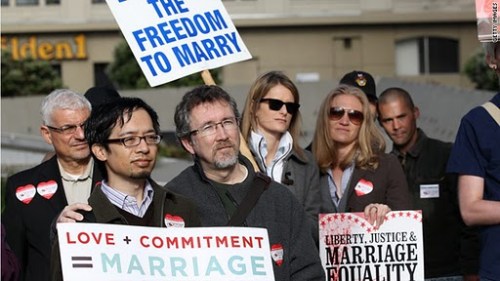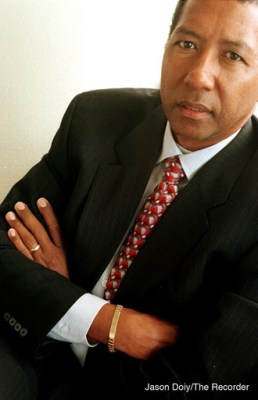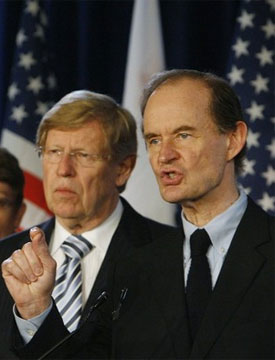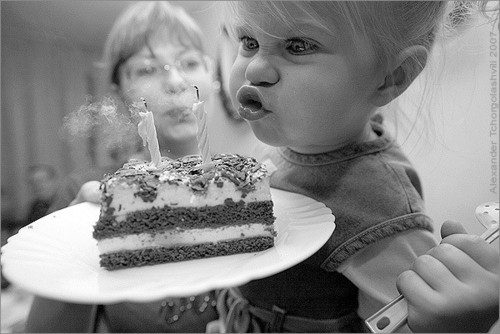Obama Administration Joins the Club, Files Amicus Brief Against Prop 8 in Supreme Court Case
So yesterday the big thing that everyone wanted to see come out of the hearings on Prop 8 finally happened: the federal Justice Department filed a friend-of-the-court brief yesterday in support of marriage equality in California and against Prop 8, as the Supreme Court gets ready to hear the case on the controversial amendment. This brief essentially amounts to an endorsement of the anti-Prop-8 case from President Obama and his administration.
The previous discussions, as the NBC News article discusses, “signaled [the administration] might stay on the sidelines.” When Obama initially announced his support for marriage equality last May, he made it clear that he thought it wasn’t a federal issue. But now that the campaign is over, this brief shows he might be willing to take a stronger stance in favor of equality, believing it should be the law of the entire land.
Or at least, it might seem like a stronger stance… if he wasn’t beaten to the punch by a fairly unlikely group of people. As we previously reported, on Tuesday a group of 75 Republicans, led by openly-gay former RNC chairman Ken Mehlman, filed their own brief in favor of marriage equality in the same case. The list included some big names – not only usual supporters of equality like the Log Cabin Republicans, but many former staffers in the Bush administration and the last three GOP presidential campaigns, noted Republican celebrities (like Clint Eastwood) and former governors, like Jon Huntsman (R-UT) and Christine Todd Whitman (R-NJ). It even included some reversals by previous marriage-equality opponents, like former CA gubernatorial candidate Meg Whitman, and David Frum. All this was a huge deal for marriage-equality supporters on both sides of the political aisle, to have so many people in a party that explicitly opposes equality in its platform standing up for us. And led to even more wondering why Obama hadn’t entered the ring yet.

Beck Diefenbach/Reuters via NY Times
It certainly is significant to see how many Republicans are standing up for the rights of LGBT Americans. But when looking at the specific names, it may not be as historic as it looks at first glance. A lot of these Republicans, such as the many big names from the Bush administration on the list, are people whose political careers are essentially over – they can afford to take chances. Or they’re from socially-liberal states, where a pro-marriage-equality stance will probably help them rather than hurt them (e.g., Meg Whitman). We aren’t seeing people who are current big names in the House or Senate who have a lot to lose if they go against their party on the issue. The Republican Party platform is still opposed to same-sex marriage, as are its most prominent, influential faces right now.
Even as a second-term president, Obama may feel he has a lot to lose in terms of budget negotiations with the House and Senate if he explicitly goes against House Republicans’ attempts to defend marriage inequality in the courts. (Some internal issues like that could be why the administration waited up until the deadline to file the brief.) But Obama has made it clear during the 2012 campaign that he supports marriage equality and has previously refused to defend the federal Defense of Marriage Act, so it can’t be that big of a jump in the likes of Boehner’s eyes.In fact, maybe it was the fact that the previous group of Republicans decided to wade into the fight that actually urged Obama to do it in the first place. Not wanting to seem like Republicans are ahead of him, he felt it was inevitable that his administration would have to file one, too. Obama’s goodwill on gay rights issues has largely been predicated on being just one step ahead of the more liberal Republicans on the issue (and, of course, miles ahead of those deciding the overall GOP platform on this), so it’s essential to stay in the good graces of the HRC and friends to keep this up.
All speculation aside, let’s see what Obama himself says about all this. The president held a press conference today clarifying his decision on the case:
The specific question presented before the Court right now is whether Prop 8 and the California law is unconstitutional and what we’ve done is we’ve put forward a basic principle which applies to all equal protection cases. Whenever a particular group is being discriminated against, the court asks the question, what is the rational [sic] for this. And it better be a good reason. And if you don’t have a good reason, we’re going to strike it down.
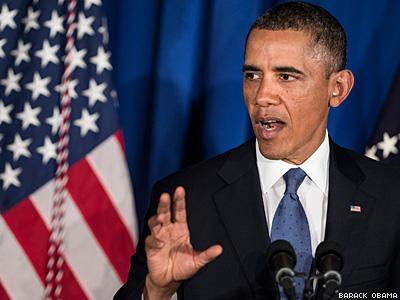
via The Advocate
Obama also seems to be going a little further than some of the Republicans involved, making it clear that he hopes that the Supreme Court’s decision on Prop 8 strikes down state gay marriage bans across the land. On the idea that the court “may rule that all bans fail Constitutional muster and allow gay and lesbian couples to marry anywhere in the country,” Obama added, “If I were on the Court, that would probably be the view that I’d put forward.” Whatever Obama said before about marriage equality not being a “federal issue” is clearly repudiated by such a statement. He has, indeed, “evolved” even further on this issue than he had in May.
So one could see this as “too little, too late,” or one could see it as encouraging: no matter what side of the political divide you’re on, support for marriage equality is increasingly a thing that wins, not loses, you votes. And we’re finally getting to see some leadership that doesn’t just take issue with specific state bans, but the idea that states should be allowed to have their own say on a basic equal rights issue at all.
Anti-Gay Groups Going Broke For Breaking Our Hearts
There’s a lot to analyze about why all four states that had marriage-equality-related ballot proposals – Maine, Maryland, Minnesota and Washington – decided in favor of the gays. Mainers, Marylanders and Washingtonians decided to legalize same-sex marriage while Minnesotans decided they didn’t want a constitutional amendment against it. It’s easy to write about how supporters of marriage equality have learned the lessons of Prop 8, and it’s clear they did; for example, reaching out to voters of color played a key part in the Maryland campaign. But it also may be that anti-gay forces simply don’t have the infrastructure they did five years ago.
In the past, while pro-gay forces may have made a valiant effort (or not), they were always out-numbered and out-funded by anti-gay forces. And the scaremongering and appeals to insincere “family values” were always going to be more affective than anything about equality and fairness, especially if it seemed like equality and fairness for a group of distant, different people who most voters didn’t know. But that’s changed a lot recently. As more LGBT Americans have come out, more and more straight, cisgender Americans can say they know a queer person. And now we have a majority of Americans who say they support same-sex marriage. As recently as ten years ago, there wasn’t a single state in the U.S. that had majority support for same-sex marriage.
So it’s no surprise, then, that groups opposed to same-sex marriage are having trouble coming up with funds. The money situation is apparently the opposite of what it used to be; Washington state’s pro-gay-marriage side raised $12.6 million to the opponents’ $2.8 million. But what’s particularly gratifying is that it’s hurting them where it matters most: in court battles. According to Reuters:
Foes of same-sex marriage are laboring to pay the tab for an epic legal case now before the U.S. Supreme Court, as the movement suffers from fundraising shortfalls that could sap its strength in future battles. ProtectMarriage.com, the advocacy group defending a California gay marriage ban now under review by the high court, showed a $2 million deficit in its legal fund at the end of 2011 – the third year in a row that expenses exceeded donations, federal tax records show.
In 2008, by contrast, Protect Marriage’s fundraising nearly matched that of the No on 8 forces. Even if a lot of that came from outside donors like the Mormon Church in Utah, rather than from Californians, the fact that even those big dollars aren’t there to help save Protect Marriage from being unable to pay their court fees says a lot.
Because as more and more people have changed their minds on marriage equality, there’s also been more accountability for groups and people that don’t. In the age of the Internet, it’s harder and harder to make a private political donation and have no one find out, especially if you’re a large corporation or famous person. Look at the recent controversy over Chick-Fil-A, for instance. If anything, companies are finding it’s more profitable to take a clear pro-gay stance than anything else. Even when homophobes showed up in droves for “Chick-Fil-A Appreciation Day” last summer, the group still attempted to cave a few months later when the backlash to their homophobia outweighed the support. And while many questioned the strength of that caving, the company’s most recent set of tax returns show no donations to anti-gay groups.
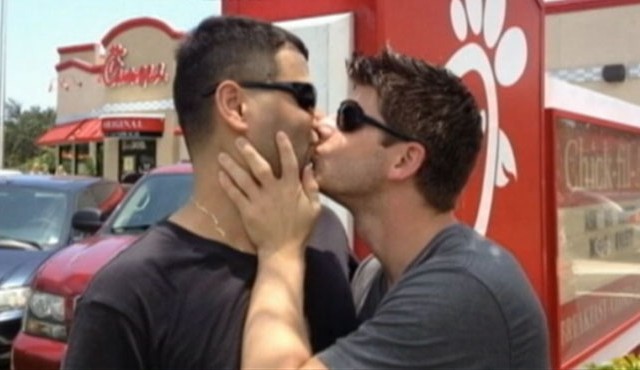
via abcnews.go.com
In the Reuters article, it’s noted how this social shaming can help make life difficult for even ordinary citizens who are committed to opposing marriage equality. It quotes Sean Fieler, who runs the hedge fund Equinox Partners and has donated over a million dollars to anti-gay groups like NOM, as saying “On the New York cocktail party circuit, the intensity of anger over the marriage issue has made being pro-life easy.” Fieler maybe can afford to be that flippant, but a lot of people are not; in 2009, the fact that sites like eightmaps made it possible for one to see private donors to the pro-Prop 8 cause raised privacy concerns when some donors started getting threats and intimidation, even though donations to political organizations have always been a part of the public record.
Then there’s the fact that even some in the Republican Party, which has made much of its success over the past several decades (like Bush’s re-election in 2004) on the backs of “social issues,” seems to want to distance itself from anti-gay politics now. In a recent interview on an Iowa political TV show, former Romney advisor Dave Kochel admitted that “frankly, the culture wars are kind of over and Republicans largely lost,” and noted that particularly young voters are straying from Republicans over their stances on LGBT rights and abortion. That distancing that Kochel might like to see is unlikely to happen as long as Republican primary voters remain extreme and the party platform remains explicitly anti-gay – but it says something that the conversation is even happening.
It often seems like things are just starting for marriage equality in the U.S. But when the anti-gay forces are losing much of what made them successful in the first place, it’s clear that it’s really the beginning of the end of this battle.
That All-Star Prop 8 Play Was So Cool, You Have To See It!
You guys, as a big fan of the book — I loved the movie!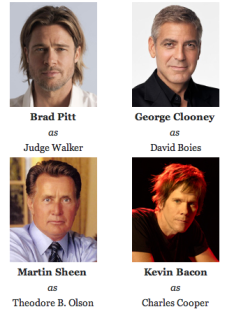
And by that I mean that I’m a big fan of the prop 8 Trial Transcripts. I’ve read them all, and I’ve read the entirety of Judge Walker’s ruling and it has been just really delightful! If you followed Rachel’s Prop 8 Trial Recap, you would know something about that delightfulness. During the trial I felt a secret bond with Rachel because we were the only people we knew who were literally reading entire trial transcripts every day, so it was like we were in a Mini-Book Club. Like we were the only ones in the world who knew about The Hunger Games.
Anyhow, Saturday night the American Foundation For Equality livestreamed a Dustin Lance Black play reading on YouTube about the Prop 8 Trial. All the trial conversations in the play are directly from the transcript of the trial, word-for-word.
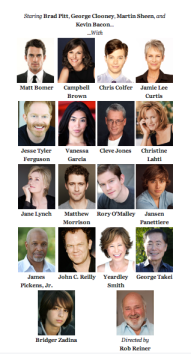
What’s great about this is that they truly picked the most effective and efficient way of getting the message out about how good this book is! Or, rather, how this trial could change the world. They gathered some famous people for a reading and put it on YouTube. Sometimes there’s only like one or two rehearsals for a reading (when nobody has to memorize their lines), so it’s not an intense time commitment — but the characters and dialogue are so rich that it’s really imperative that everybody has a chance to know this story.
A first reading of this play happened last September with a different cast. I didn’t see that one, but I saw this one, and I liked it!
So, see George Clooney, Kevin Bacon, Brad Pitt, Martin Sheen, Matthew Morrison, Jane Lynch, Chris Colfer, Jamie Lee Curtis, Jesse Tyler Ferguson, John C. Reilly, Vanessa Garcia, Yeardley Smith, Jamie Lee Curtis and GEORGE TAKEI AS WILLIAM TAM… right now:
Prop 8 Undergoes Another Review, Not Going To Supreme Court Just Yet
Although it initially seemed like Prop 8’s next step in its legal journey was the Supreme Court, it would appear that it’s making at least one more stop before it gets there. Protect Marriage, the group defending Prop 8’s existence, has asked the 9th Circuit Court of Appeals to review the ruling made by a three-judge panel earlier this month, in hopes that they’ll overturn it.
“The panel majority’s decision conflicts with decisions of the United States Supreme Court and this Court, and consideration by the [full appeals] court is therefore necessary to secure and maintain uniformity of the court’s decisions,” wrote lead counsel Charles Cooper.
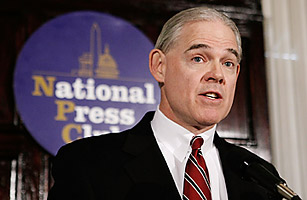
charles cooper
Cooper and his team have written a 52-page petition asking that the panel’s decision be reconsidered. Their petition doesn’t give much away in terms of what they might try to argue regarding Prop 8 in a court, but instead makes the claim that the thinking behind the panel’s recent decision is simply wrong. (The full petition is available online.)
“It is hardly surprising that every state and federal appellate court decision, including binding decisions of the Supreme Court and this Court, to address the validity of traditional opposite-sex marriage laws under the federal Constitution has upheld them as rationally related to the state’s interest in responsible procreation and child-rearing… The panel majority erred in breaking with the uniform and binding precedent upholding the constitutionality of laws adopting the traditional definition of marriage, and the Court, sitting en banc, should rehear this profoundly important case,”
It also, incredibly, re-states the assertion that Judge Walker should have recused himself from the original case because of his sexual orientation, an argument which has been shut down more than once by actual judicial authorities, but keeps raising its double-standard-ed head anyways.
What Protect Marriage is asking for is called an en banc review — technically this usually involves a review on the part of all of the active judges, which in the case of the 9th Circuit Court would be over 20 people. In this case, what’s being put into motion is called a limited en banc review, and will involve the chief justice and 10 active judges. A process like this usually lasts months; it will probably add some time onto Prop 8’s lifespan, and also means that the stay on performing marriages that was put into place after Judge Walker’s ruling will remain active. It may take a while for the 9th Circuit Court to even decide whether to agree to perform the en banc review. But on the other hand, if the court performs the review and finds that the panel’s decision to strike down Prop 8 was correct, then it may be possible for marriages to resume in California again (although the consequences of the court’s decision would be limited to California).
It still seems very likely that this case will end up in the Supreme Court at some point, although it’s now less clear when exactly that will be. And it’s frustrating to continue to see this case continue to be hung up with more stops in more lower-level courts, especially given how narrow these rulings are going to be. But ultimately Protect Marriage and the people who support them can only delay justice, not stop it from coming. The generation of people who elected Barack Obama and at the same time saw their constitutional rights taken away from them in California will also see them restored, and probably much sooner than it makes the bigots who passed Prop 8 comfortable to think about. It’s only a matter of time.
Judge Walker Still Gay, Still Totally Competent To Rule on Prop 8
Remember how despite appearances, and despite the fact that a gay couple in California isn’t currently able to get married, Prop 8 was actually struck down in court? Because Judge Vaughn Walker ruled that it was unconstitutional and discriminatory? Since the ruling, there’s been an ongoing campaign from the Yes on 8 side to try to overturn his ruling, which hasn’t been successful even though the injunction filed almost immediately after the ruling in order to stop marriages from occurring was. We’re still in the throes of the extremely drawn-out appeals process as far as the actual ruling goes, but a fun thing that the Yes on 8 crowd has been doing in the meantime is attempting to argue in court that since Judge Walker has been revealed to be gay himself, his ruling should be thrown out and he should be recused from the case.
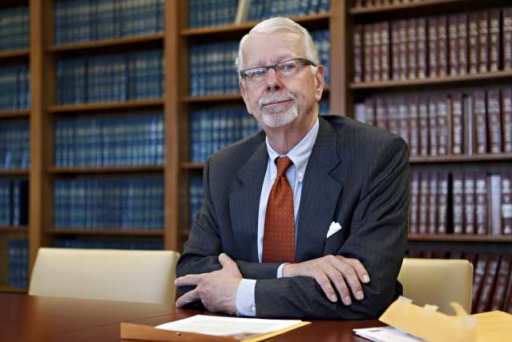
This originally happened back in June; the next day, Judge Walker’s replacement, Judge Ware, decided that Walker’s ruling was perfectly legal, in spite of the fact that (as I said at the time), “Judge Walker, like all other humans, has a sexual orientation.” His exact words:
After considering the Oppositions to the Motion and the governing law, as discussed below, the Court finds that neither recusal nor disqualification was required based on the asserted grounds. The sole fact that a federal judge shares the same circumstances or personal characteristics with other members of the general public, and that the judge could be affected by the outcome of a proceeding in the same way that other members of the general public would be affected, is not a basis for either recusal or disqualification under Section 455(b)(4). Further, under Section 455(a), it is not reasonable to presume that a judge is incapable of making an impartial decision about the constitutionality of a law, solely because, as a citizen, the judge could be affected by the proceedings. Accordingly, the Motion to Vacate Judgment on the sole ground of Judge Walker’s same-sex relationship is DENIED.
Seems pretty clear-cut, right? Well, apparently not, because now the exact same thing is happening all over again! Somehow, the Ninth Circuit Court of Appeals has ended up having to hear this same argument — that because Judge Walker is in a relationship with a man, his legal competency and ability to perform his job is compromised. The good news is that so far, most major news sources appear to be viewing the decision as almost a foregone conclusion, describing the judges as “reluctant” to entertain the notion that Judge Walker was too gay to function responsibly in the courtroom. They noted that for someone who allegedly had a personal stake in being able to marry, Judge Walker didn’t actually take advantage of it during the brief period that he was able to. And more importantly, that it’s silly to consider whether or not that was an option, because it’s not a standard that’s in any way reasonable or logical. From Mercury News:
In particular, the judges were skeptical that Walker had an obligation to disclose whether he had a desire to marry his partner before the January 2010 trial. “Does he have to say “I have no interest in ever being married, or someday, if I meet the right person, I might want to get married?'” Judge Stephen Reinhardt asked Proposition 8 lawyer Charles Cooper.
As they’ve done throughout the Prop 8 trial and its aftermath, No on 8 lawyers Boies and Olson said everything exactly right, “asking the Ninth Circuit panel whether a heterosexual judge committed to opposite-sex marriage would have to disclose that information or recuse himself or herself.” The issue at stake is simple: that a definitive part of the job of a judge is to make decisions about what the legal system of the United States calls for in a way that’s objective and based on their legal education, not their own opinions about how they would like America to look. If Judge Walker isn’t capable as a judge of looking at the issue of marriage equality from a balanced legal perspective, we then logically (that is, if we’re operating on logic instead of thinly veiled bigotry) have to question whether any judge who’s ever had marital conflict can rule in divorce proceedings, whether any judge with children can rule on a family custody case, whether anyone who fears their loved ones or themselves being raped or murdered can ever rule in a case dealing with those crimes. The judges of the Ninth Circuit Court of Appeals are well aware of this, and so the argument for Walker recusing himself seems to be pretty uninteresting to them.
Although it seems unlikely that the Ninth Circuit will rule against Walker, one part of this case is still open for speculation: also brought up in the courtroom was the ongoing issue of whether or not the full videotapes of the original trial, which have existed for years, should be released to the public. Yes on 8 argued, as they have before, that releasing the tapes would put witnesses in danger of intimidation and harassment. Since witnesses are already identified by name on transcript, this seems a little confusing, and the judges didn’t seem sold. But that doesn’t mean they were convinced by Olson and Boies’ argument that they deserved to be publicly available, either, since full transcripts of everything said in the courtroom are already there.
This is likely a minor digression in the long, winding story of Prop 8’s beginning and (hopefully) end, but it may also be the last time Prop 8 is brought up in court before the issue isn’t just the technicalities of the case, but the constitutionality of the initiative. Which, if that argument makes it to the Supreme Court, may end up deciding for the entire country whether or not bans on same-sex marriage are constitutional anywhere. The National Center for Lesbian Rights issued a statement on this week’s proceedings saying “We expect and believe the Ninth Circuit will see these moves by the Prop 8 proponents for what they are: a desperate attempt to divert attention from their utter failure to offer any good reason to uphold this blatantly discriminatory ballot initiative.” The Ninth Circuit Court of Appeals could issue their ruling on this case at any time, at which point we’ll only be waiting on the big decision: whether Prop 8 can defend itself in front of the state of California and maybe after that, the nation.
BREAKING: California State Supreme Court Rules In Favor of Protect Marriage On Standing in Prop 8 Case
The California Supreme Court has ruled that Protect Marriage has legal standing to appeal Judge Walker’s decision on Prop 8, and can continue their court case.
We had been waiting for quite some time now on the next step forward in the glacial movement of the Prop 8 case towards some kind of conclusion. For the past few months, that’s meant waiting on a decision about whether or not Protect Marriage, the Yes on 8 side, has legal standing to pursue the appeal Judge Walker’s decision that Prop 8 was discriminatory and unconstitutional.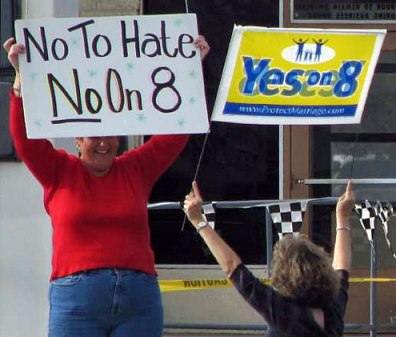
Experts were not necessarily optimistic about Protect Marriage’s being denied standing, which would mean being told that they didn’t have a legitimate basis to pursue an appeal after the state of California didn’t do so itself. Protect Marriage believes that the state is shirking responsibility by refusing to defend Prop 8, and that they should be allowed to pick up the slack. California State Supreme Court justices seemed reluctant to entertain the thought of denying standing, voicing concerns that it would set a precedent that would dramatically reduce the power of voter initiatives, especially if they’re ones that the state just didn’t feel like defending. On the other hand, however, Protect Marriage’s being denied standing would make it that much more likely that a federal court would also find them without standing, which would prevent Prop 8 from going to the Supreme Court (although that might not be such a bad thing), and would instead mean that the court case simply fell apart and marriage equality could return to California.
The court’s ruling today doesn’t mean anything definitive about the future of Prop 8 or marriage in California. It does mean that the case is much more likely to head to the Supreme Court, which is a momentous thing, but not necessarily either good or bad. A decision about the constitutionality of Prop 8 in the Supreme Court would have huge ramifications for the nation as a whole; if Prop 8 were declared unconstitutional on a federal level, it would set a precedent across America as far as the legality of same-sex marriage bans. On the other hand, if the case does make it to the Supreme Court and Judge Walker’s ruling is not upheld there, we could lose a lot of the legal ground we’ve gained for marriage equality so far. Which is where things like Obama’s nominees to the Supreme Court, like Sonia Sotomayor and Elena Kagan, become a factor. One would hope that if Protect Marriage’s performance in court is as laughable as it was in the original trial, then the Supreme Court might be the best thing that’s ever happened to the gay families of California (and the rest of the country). But if marginalized communities in America have learned anything through generations of activism, it’s that the court system isn’t always something you can count on. Today’s ruling from the California Supreme Court means we will probably have the chance to find out.
“Agreeing to Agree” on Gay Marriage
If you followed the blow-by-blow of the Prop 8 trials, then the name David Blankenhorn might be familiar to you. He was one of the witnesses for Protect Marriage, and testified as a questionably-certified sociological researcher who was DEFINITELY not homophobic, and had really nothing but good things to say about gay people EXCEPT that because gay families will never ever be as good for children as hetero biological ones and somehow, because of that, marriage equality would cause significant damage to the social institution of marriage.

this is david blankenhorn
How did Blankenhorn’s opinions and the “research” they were based on hold up in court? Well, this is what Judge Vaughn Walker said about him in his final decision on the case:

Based on his testimony, David Blankenhorn is the kind of guy you might expect to insist he “has a lot of gay friends.” And based on this article in Business Weekly, it would appear that that is true. David Blankenhorn and Jonathan Rauch, a gay man, have written together about their “unusual friendship” — the married, gay man and his married, straight friend who believes that his friend’s marriage endangers the fabric of society. They’ve been discussing the subject since at least 2009, when they wrote an op-ed for the New York Times called “A Reconciliation on Gay Marriage.”
What could they possibly have in common? A few things, according to Rauch and Blankenhorn:
+ “Prejudice” is bad, and “affirming the equal dignity of homosexual people” is good.
+ Getting married before having children is important, and something “society as a whole should do more to embrace.”
+ “The growing phenomenon of ‘single parents by choice,’ whatever its meaning or value in particular situations, is a harmful social trend.”
+ “…practices and policies need to be rethought when they deliberately and inherently deny children born through artificial reproductive technology the right to know and be known by their biological parents.”
+ Religious institutions deserve more privileges when it comes to gay marriage — like being guaranteed that they won’t have to perform it.
+ Both straight and gay couples should be able to adopt, but preference in both cases should be given to married couples.
+ “…both of us worry when we hear stories of employees being fired for opposing gay marriage in their personal lives.”
On the whole, these are some pretty general socially conservative ideas to agree on. Maybe this article could be framed differently; it’s not entirely the shock value of a personal relationship with a opponent of gay marriage, but also about the experience of being an out gay person who holds some pretty conservative and traditionalist ideas about families. Many members of the community probably have at least a few relationships with people who don’t fully support gay rights; that doesn’t necessarily preclude our caring about them, or their caring about us. For some of us, that relationship defines our entire family dynamic, for instance. But you’d be hard pressed to find many gay people who announce that they think single parenting is a “harmful social trend;” as someone who’s personally extremely grateful to have been raised by a singe parent, that was the part of this article that practically made me do a spit-take. Socially conservative gay people don’t get a lot of time in the public eye, but of course they exist — isn’t that really what this “unusual friendship” is based on?
What’s more interesting to me than the fact that Blankenhorn and Rauch both think that married couples are better at raising kids (and that Blankenhorn still does not seem to have reconciled his ideas that married families are better off but that marriage for gay people is simultaneously harmful) is their shared phrasing that really, the conversation should be about “what seems most important as the shouting stops.” Blankenhorn feels that as “the shouting stops,” the most important thing is “conciliation,” and Rauch decides it’s “getting marriage right, for all people.” Sure, those sound like nice things. But who said “the shouting” is stopping anytime soon?
Rauch and Blankenhorn seem to agree that America is headed towards some kind of better future with regards to marriage equality, and in the long-term picture, the news about DOMA seems to support that idea. But does that mean anyone is done shouting? The premise of Blankenhorn and Rauch’s article seems to be that the way forward on marriage equality, regardless of what side you’re on, calls for settling down and talking through this coolly and calmly. Does that make sense? Marriage equality is an important issue for families across the nation, but it’s also important on principle. It’s about our right to enjoy full citizenship rights in our own country. If that’s not worth shouting about, what is? Maybe more so than ever before in recent years, we’ve become comfortable using our outside voices to ask for change. We’re realizing that speaking quietly isn’t working, and that some things can only be achieved by shouting into the night. America doesn’t have a strong tradition of important social change coming out of sober, well-reasoned conversation and collective compromise; instead, we have a strong tradition of people who have grown tired of being told they need to compromise and shouting in the streets until they are heard. Compromise has proven to be a good tool for quieting conflict, but is that always a good thing? Blankenhorn and Rauch are making the case that “conciliation” is possible, but have they made a case that it should be our goal?
Protect Marriage May Win The Legal Standing Battle, But Not The Gay Marriage War
The California Supreme Court isn’t required to give a ruling on the hearing we told you about yesterday, which is meant to determine whether Protect Marriage has the legal standing to appeal Judge Walker’s decision on Prop 8 for the next 90 days, there are some who think a decision’s basically already been made. Although the case hasn’t officially been decided, several State Supreme Court justices shared their strong reluctance to approve a system in which the governor and attorney general were the only people allowed to defend and enforce laws established by ballot initiative. The LA Times has some representative examples:
+ “So the attorney general and the governor get to pick the laws they want to enforce?” asked [Justice Ming W. Chin], a conservative on the court.”
+ Denying initiative sponsors the right to appeal, [Justice Joyce L. Kennard] said, would be “nullifying the great power that the people have reserved for themselves” and “would not promote principles of fundamental fairness.”
+ “During Tuesday’s hearing, Chief Justice Tani Cantil-Sakauye suggested that there would be no one to “safeguard the precious power” of citizen initiatives if their sponsors were not allowed to defend them.”
+ “Justice Carol A. Corrigan pointed out that the courts, not the governor or the attorney general, are supposed to decide a law’s constitutionality. She asked whether elected officials have “pocket vetoes” over voters.”
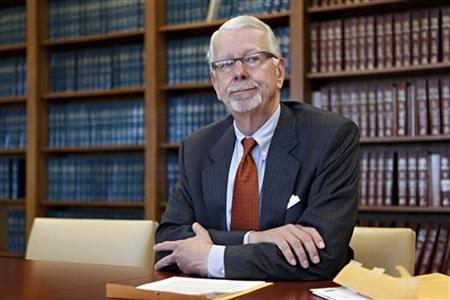
So, wow! I guess just because there are no dissenting people quoted doesn’t mean they don’t exist. Necessarily. It seems like the closest we can get to finding someone who disagrees is Justice Kathryn Mickle Werdegar, who has “suggested the California high court could avoid making a specific rule and simply write a decision that explained the practice of permitting initiative sponsors to intervene in court cases,” which seems less hardcore but also does not seem like it would really change the outcome of this particular Prop 8 issue. So is that a bad thing?
Well, not necessarily. Granting Protect Marriage legal standing isn’t the same as saying they’re right; it’s a general statement saying that the sponsors of successful ballot initiatives have the right to defend them in court if it comes to it. There are ways in which that’s a little problematic pragmatically if not legally; voter initiatives like Prop 8 are about “giving voters the power to decide,” which is their selling point but also their worst characteristic. When the voters are being given the power to decide on the rights of a minority group, it’s a) not particularly fair or ethical because by definition having a popular vote on an issue that affects a marginalized group is a loaded dice and b) as a result, the minority group almost always ends up worse off because of it. There are valid arguments for limiting the power of ballot initiatives for that reason, i.e. doing the exact opposite of what the California Supreme Court is doing right now.
On the other hand, what’s the consequence if Protect Marriage is granted legal standing? Their appeal is allowed to continue on to the Supreme Court. This creates an incredible opportunity — one of the biggest marriage-equality cases in history going before the Supreme Court in a time where the President and Department of Justice have recently decided to stop defending DOMA and declare at least part of it unconstitutional. If the Supreme Court chooses to follow that line of legal reasoning to its logical conclusion, Prop 8 could be declared unconstitutional by the Supreme Court, which would be a huge, historic precedent that would change the way marriage equality is legislated in America — in a good way. So, it’s possible that Protect Marriage winning this chance to appeal in the short term could lead to us winning a much bigger victory in the long term.
It’s possible, though, that even if Prop 8 does make it to the Supreme Court, they’ll shy away from being responsible for such a big decision. Also from the LA Times:
If the 9th Circuit determines that ProtectMarriage has standing, a three-judge 9th Circuit panel is likely to overturn Proposition 8 on constitutional grounds, and the case will probably then go to the U.S. Supreme Court. But the U.S. Supreme Court could reject the appeal on grounds of standing, limiting the case’s effect to California.
Both Santa Clara’s Uelmen and UC Davis’ Amar said they would not be surprised if the U.S. Supreme Court ducked the constitutional issues by denying standing to ProtectMarriage and avoiding a ruling that would affect the rest of the country.
In terms of the case, however, the timing has never been better — as we found out in the original trial, Protect Marriage may have legal standing, but they also have a terrible case. Few things would be more validating, and possibly more productive, than having them try to play out the same farce all over again in front of the Supreme Court. Edith Windsor’s case against DOMA is still in progress; if Prop 8 makes it to the Supreme Court level as well, how much more weight can DOMA bear?
If you’d like to make your own judgment on how the Sept. 6 hearing went and the arguments presented, Towleroad has full video.
We won’t know the ruling on this hearing for a while yet, and if this case does make it to the Supreme Court, it won’t be until next year. This feels very slow, because it is. But these are, hopefully, the milestones on the way to a time when all this will be considered our dark, dangerous past of second-class citizenship and ‘separate but equal,’ never to be returned to again.
Prop 8 Update: What’s Happening Today In The California Supreme Court
Have you, too, been missing your regular doses of our faithful defenders Olson and Boies? Since they made an appearance in the Ninth Circuit Court of Appeals nine months ago, things have been a little quiet on the Prop 8 front.
Sure, we’ve had some peripheral issues under consideration. Just last week, Judge Ware (who replaced Judge Walker upon retirement) was asked to consider whether the tapes of the trial should be released. And earlier this summer, Judge Ware confirmed that straight white men aren’t the only people qualified to be judges/make decisions about our country.
But the last time we were discussing the substance of the case it was still 2010. Congress was weeks away from voting to repeal Don’t Ask, Don’t Tell. No one would have dreamed that the Obama administration would stop defending DOMA. Marriage equality in New York was still just a dream. It was a completely different world.
The court system is slow.
Today, we return to the substance of the case.
Olson and Boies will appear before the California Supreme Court arguing about terribly important procedural matters. Remember when Judge Walker issued his 138-page opinion on how we don’t fuck up kids and we won’t keep the heteros from marrying and gay marriage is better for cities and better for the world? If you need a dose of reassurance or to feel good about the world, go read that again. Today’s arguments are not going to make you feel that way.
Instead, the California Supreme Court will be weighing in on what might seem like a mere legal technicality. The Ninth Circuit Court of Appeals has asked the California Supreme Court to answer a very specific question about the rights of the Protect Marriage folks to continue with the case. Specifically, the Ninth Circuit wants to know whether, under California law, the official proponents of an initiative measure have an interest that allows them to defend the initiative when the state chooses not to do so.
If this seems less interesting than, say, the pervasive history of discrimination against gay and lesbians, that’s because it is. No one likes the procedural technicalities of the courtroom. But the fact is, the future of the case turns upon this question.
Why does this matter?
Federal courts are courts of limited jurisdiction; as a Constitutional matter, they are only allowed to hear certain kinds of cases, and only when these cases are pursued by parties with a sufficient connection to the case. Before the Ninth Circuit can consider the substance of the case, the Court must first determine whether those challenging Judge Walker’s decision even have a right to be in the courtroom. Or in legal terminology, whether the appellants have standing. If the appellants don’t have standing, there is no case. Which is to say, if Protect Marriage doesn’t have a right to challenge Judge Walker’s decision, there is no appeal and Judge Walker’s decision will stand.
So before the Ninth Circuit can consider whether Judge Walker ruled properly, the Court must first determine whether Protect Marriage is entitled to pursue the case.
Who has standing?
Generally state officials defend state laws. As representatives of the people, state officials have standing to defend the people’s laws. In this case, though, both Governor Arnold Schwarzenegger and Attorney General Jerry Brown declined to defend Prop 8. Since California declined to defend the law, Protect Marriage stepped in to defend the law before Judge Walker. When they lost, they appealed the decision to the Ninth Circuit.
However, it is unclear whether Protect Marriage has legal standing to defend Prop 8.
Back in 1997, in the case of Arizonans for Official English v. Arizona, the Supreme Court expressed “grave doubts” about whether the sponsors of a ballot initiative have standing to defend the initiative when Constitutionally challenged. But at the time, the Court also reprimanded the Ninth Circuit, saying that “more respectful consideration should have been given to the Attorney General’s requests to seek, through certification, an authoritative construction of the [law] from the State Supreme Court.”
In essence, that is what is happening today. The Ninth Circuit asked the California Supreme Court to answer a two specific questions about California laws to help determine whether Protect Marriage has standing. If the California Supreme Court determines that Protect Marriage has either “the authority to assert the State’s interest,” or a “particularized interest in the initiative’s validity,” the Ninth Circuit could find that the ballot proponents have standing and the appeal could continue. If the California Supreme Court finds neither, it is unlikely that the Ninth Circuit will find that Protect Marriage has standing, either.
This case could have implications for ballot initiatives in general, and whether the sponsors of those initiatives have standing to defend them across the board. Since ballot initiatives are considered questionable practice by many, since they represent only popular opinion and often turn out to the disadvantage of minority groups, some consider this a good thing. Others worry that in cases like this, where the Governor and Attorney General have refused to defend the initiative, it gives the state an unintended option to “effectively veto” initiatives that they don’t like.
So what should we hope for, today?
Quite honestly, it’s impossible to say. Some people, like Santa Clara University professor and expert on the State Supreme Court Gerald Uelman, think that Protect Marriage’s chances of being granted standing might be good.
The current court, which is moderately conservative, “hasn’t put any reasonable limits” on initiatives and gives them “every benefit of every doubt,” Uelmen said. From the court’s perspective, “it would just be unacceptable to permit a total nullification of an initiative by virtue of the attorney general’s refusal to defend it,” he said.
Others say there’s no way to know.
If Protect Marriage does not have standing to continue the appeal, the case is over. Proposition 8 will be dead. California will have marriage equality, once again.
But if the case cannot continue, the results end in California. The U.S. Supreme Court will not have this opportunity to decide whether marriage equality is constitutionality required, and we will have to keep fighting this battle state by state. (At the same time, the Supreme Court will not have the opportunity to decide that marriage equality is not constitutionally required, which could set us back years in this fight).
So for now, we wait. And hope for the best, whatever that may be.
(You can also check in with Prop 8 Trial Tracker all day today for coverage of the hearing, which will begin at 8:30 AM PST.)
What Happened With Judge Walker: Gay Judges Officially Ruled Okay As Judges
As we were already pretty certain of yesterday, Judge Ware has ruled that Judge Walker’s decision on Prop 8 is valid despite the fact that Judge Walker, like all other humans, has a sexual orientation. The full court decision can be read here; while it can’t compare to the pure poetry of Judge Walker’s original 138-page decision, but there are a few gems. Most notably, this paragraph here:
After considering the Oppositions to the Motion and the governing law, as discussed below, the Court finds that neither recusal nor disqualification was required based on the asserted grounds. The sole fact that a federal judge shares the same circumstances or personal characteristics with other members of the general public, and that the judge could be affected by the outcome of a proceeding in the same way that other members of the general public would be affected, is not a basis for either recusal or disqualification under Section 455(b)(4). Further, under Section 455(a), it is not reasonable to presume that a judge is incapable of making an impartial decision about the constitutionality of a law, solely because, as a citizen, the judge could be affected by the proceedings. Accordingly, the Motion to Vacate Judgment on the sole ground of Judge Walker’s same-sex relationship is DENIED.
In a lot of ways, it seems like a reboot of the original Prop 8 trial: the exact same deeply incompetent lawyer, Charles Cooper, and a patient but wearying judge who has to sit through the same arguments repeated over and over no matter how many times they’re shown to be groundless. A great deal of the back-and-forth can be read at Prop 8 Trial Tracker, although unfortunately it isn’t quite the laugh-a-minute thrillfest that the original trial was – reading this feels more like watching a remote-control car run into the wall again and again until its battery runs out. An example:
Judge Ware: What is the fact you rely upon that Judge Walker was in a relationship for purposes of marriage?
Charles Cooper: The fact that he has publicly announced that he is and has been in a relationship with another person?
W: So if you are in a ten year relationship with another person, that is for purposes of marriage?
….
W: You would concede that you could be in a long term relationship without being in it for purposes of marriage?
C: Yes.
W: What distinguishes it?
C: The very fact that two individuals are in kind of relationship Walker has…
W: What distinguishes between two?
C: There are platonic friendships that do not lead to marriage. [laughter]
W: What do you mean platonic?
C: Non-intimate, non-sexual. Clear understanding of media reports…
W: You are saying that length of relationship alone converts to marriage relationship?
There’s plenty more where that came from!
An unavoidable fact of this hearing on, more or less, whether or not minority groups are able to respond reasonably to issues that affect minority
groups, was that the judge presiding over it does in fact belong to a racial minority. Although this case doesn’t boil down to a comparison of the experiences of racial and sexual orientation minorities, it does throw the real facts of this case into relief. Judge Ware has worked hard to get to his position, the exact same position that Judge Walker previously held; he’s earned the power to make this decision with an impressive previous career. Although we can’t know for sure, it’s extremely likely that he’s worked even harder than a white person in his position would have, because as a black man he almost certainly had to face obstacles and prejudices that a white person wouldn’t. To try to tell him in a court of law that he might be somehow unqualified to judge on issues of, say, racial discrimination or civil rights, because his experiences have somehow made him less and not more able to understand and therefore make judgments about those issues, seems pretty pointless. And it was.
A slightly more interesting aspect of the story is that of the tapes made of the original Prop 8 trial. As you may recall, the trial was originally meant to be broadcast on national television, an amazing opportunity that would have allowed people all over the country to learn the real facts of Prop 8 and the hugely inappropriate assertions of the Protect Marriage campaign. The broadcast was ultimately prohibited, but tapes from the original trial still exist. Tapes that include the almost innumerable blunders of Yes on 8 witnesses, along with a lot of very powerful testimony from our side and a lot of deeply unimpressive testimony from Protect Marriage. The tapes are now under seal and protective order, and can’t be released to the public, but can still be reviewed by people involved with the case. Charles Cooper apparently wanted these tapes to be off limits for even those purposes – so they can’t be reviewed by lawyers involved? So they can’t be reviewed by Walker himself? So they can only be reviewed by Walker? To be perfectly honest, after all the coverage of the hearing, I still have no idea what Cooper was going for here, and am comforted only in that Ware doesn’t seem to either.
Ware: My understanding is they were placed under protective order. Your understanding is that must be used only in court.
Cooper: Yes. Court’s amendment to assurances were consistent with court rules on videos. Plaintiffs under protective order. We did not prevent.
Ware: Any authority that judge is subject to protective order?
Cooper: No. We haven’t voiced that consideration.
Ware: Sounds like an argument as to whether Walker made a mistake by displaying videos publicly. No such motion. If there were, I would want Walker present. Why are you doing this?
Cooper: Not sure what you mean by “mistake.” We say Walker’s use was a mistake and contrary to rules.
Ware: What relief you seek from me?
Cooper: Seeking that court as custodian of record of case esp. that which is sealed ordered that all persons return them to the court including Walker.
Ware: You want me to order all parties to return to court and not to allow further use even on appeal?
Cooper: Our view is different for plaintiffs.
Ware: That’s a no. I don’t understand the protective order to preclude use by parties.
Now that we can agree that no one, possibly not even Cooper, understands what was being asked for with regard to these tapes, we can move on to the fact that this motion was denied. Does this mean that the tapes of David Blankenhorn yelling belligerently on the stand when it was revealed he had no peer-reviewed research background, or Kenneth Miller’s floundering when asked basic questions about his “field of expertise,” or William Tam’s claiming that gay people are “12 times more likely to molest children,” will be available in living color for further ‘review’ when this case eventually goes to the Supreme Court? This is unclear. It probably won’t, because that would make me happy.
But in any case: We Won A Thing. Specifically, we won a thing that helps ensure no one is going to go back in time and try to have us un-win the important thing we already won. And it’s comforting to know that Judge Ware is keeping the tradition of dry, self-aware judicial humor alive and well in the U.S. District Court for the Northern District of California.
Judge Ware was the person who first gave Judge Walker a copy of the trial recordings at a retirement/ passing of the gavel ceremony. Ware asks Cooper if he should recuse himself? There’s an audible laugh from the gallery. “I don’t need an answer now,”
Claim that Gay Judge is Unfit to Rule on Prop 8 Gets its Dreadful Day in Court, Hurts Our Feelings
Astute readers may have noticed that despite our obvious fascination with and obsessive analysis of the Prop 8 case and its aftermath, we’ve pointedly avoided covering the latest “development:” the accusation by Yes on 8 proponents that Judge Walker’s decision should be overturned because he is a gay man ruling on a gay rights case. Although the issue has come up in the news again and again, we’ve ignored it each time, not willing to waste time or words or resources or brain cells covering something that should never have been “news” in the first place – especially not while there are real issues that, by virtue of not being imaginary problems, actually affect the lives of people in our community.
But today there was an official hearing on the issue of whether or not Judge Walker is qualified to deal with sexual orientation in the course of his profession, being that he himself has a sexual orientation that is not “straight.” The judge will make a ruling within 24 hours. From Slate.com:
The hearing today took place in the courtroom of Chief Judge James Ware, who took over the Prop 8 case after Walker’s retirement. Both were George H.W. Bush appointees. Ethics experts were quick and nearly unanimous in opining that this effort to overturn Walker’s decision on the basis of his relationship is specious as well as desperate. No claim that a federal judge should have been barred from hearing a case because of race, gender, or religion has ever succeeded, a point made by California Attorney General Kamala Harris in her brief opposing the motion to vacate this ruling: “Just as every single one of the attempts to disqualify judges on the basis of their race, gender, or religious affiliation has been rejected by other courts, this Court should similarly reject Defendant-Intervenors’ effort to disqualify Judge Walker based on his sexual orientation.”
We can’t avoid talking about this any longer, but there’s also really only one thing that can be said:
This is the absolute last thing we should ever have to waste time talking about, and it’s insulting that we’re forced to.
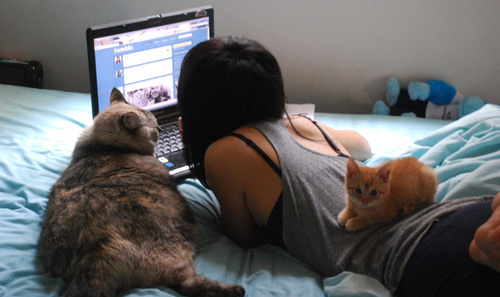
we'd rather be on tumblr
You may remember this happening before, in the case of now-Supreme Court Justice Sonia Sotomayor. Because of a (completely true and commendable) comment about how her life experience informs her job skills, and because, if we’re being honest, her skin is brown, Sotomayor was subjected to relentless grilling from room after room of old straight white men about whether her “experience” was not really a “bias” that would prevent her from doing her job. Because none of their life experiences as deeply over-privileged (usually white/straight) people ever informs the way they think or legislate in cases that involve poor people or people of color or welfare recipients or women or immigrants or women or religious minorities. Of course.
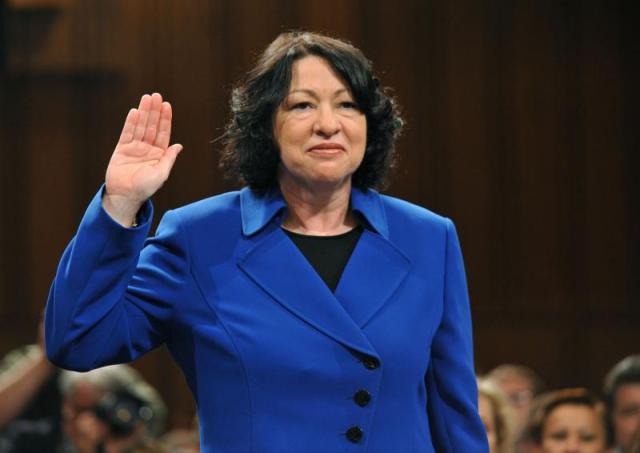
Sonia Sotomayor is now a Supreme Court Justice, though, and it’s very unlikely that this case will end up damaging Judge Walker’s judicial record or rulings, either. The case is being heard by Judge Ware, the judge who has stepped up to take Judge Walker’s vacated seat, and tweets from the courtroom seem to indicate that he doesn’t have much more patience with Yes on 8 attorney Charles Cooper than his predecessor did. But that doesn’t change how insulting it is that something this absurd has ever made it as far as it has. A helpful analogy from the Atlantic’s Andrew Cohen, to illustrate exactly how outrageous a claim is being made:
So let me take you to the baseball diamond. It’s the Yankees versus the Red Sox (don’t read anything into my selection of teams, pick your own if you’d like). The Red Sox are crushing their opponents. It’s 15-0 in the 6th inning. The Yankees’ pitchers aren’t pitching and the Yankees’ hitters aren’t hitting. The bases are loaded with Sox and New York manager Joe Girardi decides after a visit to the mound not to replace his pitcher, who has been battered about like a rag doll by Boston’s hitters.
“Are you sure about that decision, Joe?” the home plate umpire politely asks Girardi as the manager begins to walk off the field. “I just want to make sure I’ve given you a chance to try something else.”
“We’re fine, ump,” Girardi responds. And the game continues. It ends 21-0. Eight months later, the Yankees find out that the umpire was dating someone from Boston.
They immediately call Major League Baseball Commissioner Bud Selig and share with him their new evidence.
“The game was rigged!” the Yankees cry. “That ump had it in for us. The fact that he is dating someone from Boston creates a reasonable suspicion that he was unfair and called the game in favor of the Red Sox. The game should be a do-over.”
“But you guys got crushed,” Selig responds. “It was never a close game. What, possibly, could this umpire have done to influence the impact of this game more than he otherwise would do in the normal course of business?”
“He’s from Boston, judge,” the Yankees say. “That’s all you really need to know.”
It’s an accurate depiction of the situation for the most part. Except imagine that Selig holds out until finding out that the ump is gay, and then shrugs and says “Well, I guess you can go to court if you want. It’s a free country.”
This isn’t insulting or shameful just because it attempts to make a joke of the legal system, or affects a complete and total lack of understanding about the judicial process. (Although it does.) We’ve refused to even think about entertaining this story before now because it’s about where gay Americans stand, and how much progress we’ve made. Which is, apparently, not much. While in general the ‘oppression olympics’ are not something worth engaging in, it’s hard to avoid wondering “Could this ever, ever have happened if Judge Walker was anything other than gay?” Cohen’s of the opinion that it couldn’t:
“No reasonable person in America today would challenge a black judge by claiming he could not fairly judge a civil rights case. No reasonable person in America today would challenge a female judge claiming she could not fairly judge a case about women’s health. “
I’m not convinced that’s true. While I can’t call any examples to mind, they don’t actually sound outside the realm of possibility. But the fact is, they’re not happening right now, and this is. To those of us who followed the Prop 8 trial in detail, it was one of the most affirming and validating events of this generation. We were vindicated in our long-held belief that the evidence of our own hearts and lives and families is real and is valid, and vindicated also in our belief that the “evidence” of the bigots who attack us is flimsy at best, and laughable at best. At the end, we were given a 138-page decision that explained in detail why we were right to be angry that our rights had been denied for so long, and compiled irrefutable evidence that the slights and injuries we deal with are real.
As seminal as it was, the Prop 8 trial didn’t change much on the ground; marriage in California still hasn’t actually been re-instated, and the experts seem to agree that this will end in the Supreme Court one way or another. For most of us, the real value of Judge Walker’s Prop 8 decision was personal, was emotional, and that’s what this is trying to take away. No matter how this hearing turns out – the result will, again, likely be in Walker’s favor – the implication of its happening at all is clear: all of that is ultimately meaningless, because we’re just a bunch of queers. That isn’t hyperbole; that’s exactly the intended message.
Maybe in the end this hearing will be a good thing; maybe it will create some kind of precedent that can protect future judges and future decisions from the same attack. Maybe this will, in a roundabout way, make it safer to be an out gay judge. But right now, it’s just a slap in the face.
James Ware Replaces Judge Vaughn Walker: Will It Affect Prop 8 and Gay Marriage?
As you may recall, our favorite human being in the whole world (at least our favorite federal trial court judge) retired at the end of last year, leaving us with fond memories and an incredible 138-page decision on why Prop 8 is unconstitutional. Now it looks like his giant homosexual judge shoes of chief judge for the U.S. District Court of Northern California are being filled by Judge James Ware.
What do we know about Judge Ware? What does this appointment mean for Prop 8? Well, there are a few different factors at work here. First of all, it may or may not mean anything at all for Prop 8 depending on how the current appeal of Prop 8 goes. It’s still completely unclear (at least to me) how long the case will sit with the California Supreme Court, or where it might go after that? The State Supreme Court’s decision has a lot to do with where this case goes next; it’s been widely speculated that it could reach the Supreme Court of the US depending on what happens with its appeal (and who knows what that would mean, what with The DOMA Thing? Not us!) The collective opinion of people who have opinions on this sort of thing is that it will end up back in the Ninth Circuit Court of Appeals “later this year.” (Possibly fall?) How it does there will determine whether Prop 8 ever ends up back in a federal trial court, such as one that Judge Ware might preside over.
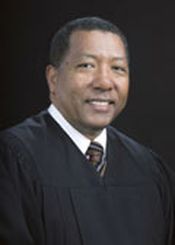
BUT in the event that that does happen, what is up with this Ware dude? Well, we don’t actually know much. But here are the facts as we see them:
+ He’s been nominated to judicial positions by both Bill Clinton and George W. Bush, making it difficult to pigeonhole him as either liberal or conservative.
+ We don’t know for sure, but it seems statistically unlikely that he is gay, as Judge Walker was.
+ He did once rule that students have a right to sue their school district for homophobic harassment.
Ultimately, there’s only so much that a long-distance analysis, no matter how in-depth, of a judge’s background can give us. We have to believe that Judge Walker ruled in our favor not because he’s gay, but because his understanding of the law led him to believe that Prop 8 was insupportable by legal principles and precedent – as his exhaustive ruling would indicate. And in the eventuality that Judge Ware does make a ruling on Prop 8, it will also be informed by his legal interpretation, which will be completely personal to him while at the same time as untainted by his personal views and opinions as he is able to make it. And so really, there’s no way at all for us to know. We can only do what we’ve been doing for the past two years and also our entire lives: sit tight, hold hands, and hope for the best.
The Prop 8 Appeal Hearing: OMFG What Happened
Are you ready? Are you really ready? I don’t think you’re ready. I know I’m not ready. Anyways, ready or not, here’s more or less what went down during the Prop 8 appeal hearings, cobbled together from a variety of Internet news sources because no one on the Autoteam has a TV. See what I mean? You aren’t ready.
A quick recap to bring everyone up to speed: this is an appeal brought by the Yes on 8 side in an attempt to change the ruling Judge Walker made back in August, which was to declare Prop 8 unlawful. (You can read our post on it, which includes the 138-page decision that we obvs had a lot of feelings on, to catch up.) The hearing will determine whether this appeal has enough ground to stand on that it should be taken seriously; if it’s not shown that the apellants have “personal, concrete, particularized interest” in the outcome of this case then their appeal can be thrown out. In order for an appeal to have standing, the people bringing it to court should be able to prove that they’re directly experiencing negative effects from the ruling that they’re appealing. For obvious reasons, the question of whether straight people in California are affected by Prop 8 is a pretty contentious one, and was actually kind of the point of the original trial. Whether or not the appeals court seriously entertains the idea that the Yes on 8 side has grounds to object to the ruling will determine whether this case moves forward.
That said, we can get on to the events of the day! (Narrated with the help of Prop 8 Trial Tracker.)
The event took place in a much smaller courthouse than the original Prop 8 trial, and while technically open to members of the public, only those who could fit inside the space were allowed entrance. Some people had apparently been waiting since 4 am (the hearing began at 10 PST), so they obvs got first crack. A+ for effort guys. As for the rest of us, hey, good thing this was broadcast live, yeah? Look at all these old white men!
The official festivities begin with Charles Cooper, a Yes on 8 attorney that many of us remember well and fondly as saying a lot of insane shit that we had to work though in therapy later. He begins by talking about the legal concepts of constitutionality and standing, which are the main points that this hearing is meant to explore, and also uses as an example a case on the public school “moment of silence” in New Jersey. So far I do not understand 100% of what is going on, and unfortunately I think that’s about me and not Cooper. Embarrassing.
Oh, ok; I think he was bringing that case up as an example of a time when the traditional understanding of “standing” was set aside. The judge asks if Cooper has any federal examples of this happening, and obvs he doesn’t. There is another case, Strauss something, which pertains to this situation in a way I don’t understand, possibly both attorneys wore striped ties or were deeply sexually repressed or something, and Cooper talks about this for a while, to what effect is unclear.
I’m not feeling real good about the hearing at this point, to be honest, because while the original Prop 8 trial focused mainly on our hearts and stuff, this seems like it is mostly about legal stuff that sounds like magical chanting to me. Where is Jessica. Let me give you an example:
Now, in Arizonans, Justice Ginsburg says that proponents do not have Article III standing, that is to say whether they have standing under the judiciary article of the Constitution. Cooper is trying to avoid that comparison, by pointing to the prior New Jersey case (Karcher). In Karcher, the Legislative officers were given standing. As noted, Karcher was before Arizonans, so it must be read in context of Arizonans.
I KNOW RIGHT?
Now we’re arguing for “Imperial County to have the right to have standing for representing the entire state.” I think that was in the Wizard of Oz, no? I would not blame you if you, as a layperson who only wants to know if you are going to be able to watch adorable weddings at City Hall in the near future, skim this section. I think the key takeaway here is that the Bad Guys are trying to find nitpicky legal reasoning for why their beef with Judge Walker is legitimate, and the judge is failing to be super convinced. “Reinhardt is lambasting Tyler for not knowing the answers and instead of saying he doesn’t know, jumping around the issue.” Okay, wait, I see how we’re playing this: Tyler is saying that county clerks would be affected by changing the current status of Prop 8, and since they’re state officials in the technical capacity of performing the state duty of assigning marriage licenses, that the state is affected by Prop 8 and therefore has standing to make an appeal. Hot damn. I feel like Tyler just broke into the refrigerator and ate an entire wheel of cheese. I’m not even mad, I’m just impressed. You – really? That’s your argument? Okay! I’m in! Let’s do this thing! Apparently the fact that there are no county clerks in the building is a hindrance. I guess they were supposed to find one and have him testify as to how oppressed he was? I don’t know! I’m excited to find out!

Now Boies is up to bat, and asks the court some to-the-point questions about the passage of power in the marriage process and what relationship county clerks actually have to the injunction against Prop 8. “Reinhardt asks, are the clerks of Alameda and Los Angeles counties bound by injunction? Boies says no. Marriage is a statewide, not local/municipal, concern.” There’s some elaboration of this point, but the fundamental fact is: the duty of a county clerk is not basically changed by Prop 8, or more specifically its repeal. So, no standing for an appeal? That’s what I’m hearing over here. But then again I’ve also listened to “All The Lights” 8 times in the last hour, and have no legal education, so maybe don’t listen to me.
There’s some discussion of the attitude of the state administration towards the bill – I think that since this entire lawsuit is kind of breaking new ground, no one is entirely sure whose court the homosexual ball is in. One of the judges is wondering whether the Attorney General and Governor Schwarzenegger effectively nullified Prop 8 already by not appealing the injunction themselves (Cooper and Tyler don’t represent the governor’s office). As far as I can tell, no one answers this question. Actually watching the C-SPAN broadcast may, in retrospect, have been helpful.
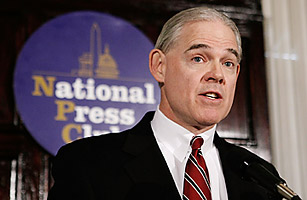 The gist of Boies’s presentation right now is to remind us all of the strict requirements that the legal definition of “standing” actually says an apellant needs to meet: “one does not have standing to act as defendant unless he/she/organization has personal, concrete, or particularized injury.”
The gist of Boies’s presentation right now is to remind us all of the strict requirements that the legal definition of “standing” actually says an apellant needs to meet: “one does not have standing to act as defendant unless he/she/organization has personal, concrete, or particularized injury.”
He maintains that under these conditions, the county clerk isn’t affected, and therefore has no standing – I think that Cooper & Co are in fact bringing this appeal in the name of the county clerk, which is why she’s being beaten over our heads like a foam noodle in a public pool. Apparently the scope of the injunction is very specific and doesn’t apply to this woman, although Boies does allow that the registrar “have to change the form and content of the marriage license.” Hoo boy! Exciting!
Cooper gets back up for five more minutes and says something annoying and childish about the two cases he’s already referred to, and, if this transcript is right, literally tells the judge to “ask the California Supreme Court.” Specifically they should “ask them” because allowing “the will of one judge” to supersede the will of voting Californians is evil and wrong. It’s just totally weird because that’s, like, a judge’s job? And, like, not the job of the voting public? But hey, what do I know, I’m just a dumb blonde who learned everything she knows about the judicial system from School House Rock. This still might be more than Cooper knows, though, so.
Now we’re taking a quick recess before moving on to the next part of the hearing. The judge divided the hearing into two sections beforehand, which is pretty neat and I didn’t know you could do: the first hour was for discussing standing, which we did, and the next hour is to discuss the constitutionality of Prop 8, specifically whether or not its discriminatory nature denies gay Californians their constitutional rights. Are you pumped? Yeah totally me too.
And OH SHIT SON this looks way better than the first section already; Judge Hawkins just asked Cooper if racial segregation in schools could be reinstated by popular vote, which is really kind of a brilliant question that I think gets to the heart of the issue. Cooper is like “well, uh, no.” There’s a small Prop 8 trial flashback where Cooper says that this is totally different because there’s a “rational basis” for denying same-sex partners marriage, and there wasn’t in the case of segregation. I almost feel like he has maybe forgotten that by saying this, he will then be required to explain what that rational basis could possibly be, but hey, it’s his funeral.
When pressed on this issue, Cooper talks about procreation, which was the h8er’s go-to argument during the trial, “redefinition of the institution” blah blah blah, and then pushes it further by saying that “you cannot separate the two,” meaning the word marriage and the nebulous social “institution” he loves so dearly. Specifically, what he says is “If we do, what we are left with is a genderless institution that bears no comparison to the real institution of marriage.” I am still genuinely fascinated that someone thinks that gender is an inherent defining characteristic of “the real institution of marriage,” but sure, let’s continue.
Cooper and the judge also have a back-and-forth about the Romer case, which I understand took place in Colorado; an amendment that would have changed many basic facts of life for gays and taken away a whole host of rights was defeated in court. Cooper argues that this was different because it affected many rights, not just one, and the judge asks why that makes any difference. Cooper… doesn’t know.
The H8er’s arguments here are less original and interesting than in the first section, mostly because they don’t really have any. They’re doing the same thing they did during the trial, which was to hold forth like a revival tent preacher on how procreation is the building block of the red-blooded American marriage and how changing the definition of the word is the last crumbling social building block that will allow our culture to dissolve entirely and give the world over to Zool and her army of giant killer marshmallow men, as detailed in the 1984 documentary Ghostbusters. But since the only evidence they have for these things is those facts themselves – i.e. procreation is necessary for marriage because everyone knows that marriage requires procreation – so basically things are getting a little tiresome up in here.
When asked about the details of a referendum and the fairness of taking away people’s families at the ballot box, Cooper says that the voting public forms “a tribunal over the Constitution,” which sounds insane to me, sorry. I am getting the sinking feeling I get every time the Yes on 8 side talks in court, which is “I think they are maybe making all this up?” Here’s TrialTracker’s breakdown:
The argument seems to be boiling down to the word. This is shaky ground for Cooper. He is now arguing that marriage (the word) is just special. He is arguing that marketing is somehow enough of a reason to discriminate. Cooper and Smith are going back and forth, looking at Roemer, and whether states can be damaged constitutionally by acting towards giving rights.
Now the other half of the Dream Team is up, and Olson is talking about how the Supreme Court has never worked on the definition of marriage as one man and one woman for any other case involving marriage – when “ruling in the context of prisoners, contraception, divorce, other cases [they have said] that marriage is (a) liberty (b) privacy (c) association (d) identity… [the] Supreme Court has said this 14 different times.” He refocuses the flow of the discussion from voter’s or state’s rights (the “good of society”) to individual rights, which is, uh, what America is about. Specifically the individual’s right to marry their partner when it doesn’t affect a single other soul in the world, which is what we’re looking at here. He’s kind of just recapping what happened in the original trial, which makes sense because he and Boies did a really thorough job taking apart the h8er’s arguments there, and bringing all that back to the judges’ attention really should be enough to end this hearing. He adds that Cooper’s argument doesn’t “stand up to even the lowest level of rational basis.”
Olson has the Chief Deputy City Attorney of San Francisco, Therese Stewart, here to talk about the anti-gay animus that drove Prop 8. She doesn’t have to talk for long; she states that “equal protection doesn’t allow the state to enact a measure based on a view that some people are unworthy,” which describes the situation nicely I think. Cooper rebuts by making farting noises with his armpit. Just kidding, he says some irrelevant stuff about Loving v. Virginia. Not impressed.
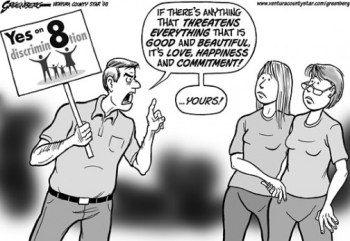 Both Olson and Cooper make closing arguments; Olson’s are carefully chosen and elegantly presented, going to the the fact that no one has ever been shown to experience harm because of a same-sex marriage and that the California court system’s treatment of gay people is irrational, haphazard and unjustified. Cooper’s is an annoying reiteration that yeah, totally, “singling out a class of people” would be wrong, but not protecting marriage! Sometimes I like to imagine Cooper’s words as if he had just inhaled a tank full of helium, and then it makes things a little easier.
Both Olson and Cooper make closing arguments; Olson’s are carefully chosen and elegantly presented, going to the the fact that no one has ever been shown to experience harm because of a same-sex marriage and that the California court system’s treatment of gay people is irrational, haphazard and unjustified. Cooper’s is an annoying reiteration that yeah, totally, “singling out a class of people” would be wrong, but not protecting marriage! Sometimes I like to imagine Cooper’s words as if he had just inhaled a tank full of helium, and then it makes things a little easier.
SO! There we have it. Where does that leave us? Where are we? Where is my wallet? We don’t know yet what the court decided. The pointed questions that the panel of judges asks have lead some to believe that they’re already a little skeptical about Cooper’s arguments, but bear in mind that while they’re aware of everything in Walker’s ruling, this panel of judges isn’t required to draw the same conclusions he did, so while Cooper & Co did a really terrible job proving any of the points they brought up today in the actual trial, that doesn’t guarantee anything. And everyone involved in this case is very aware of its potential scope – if it makes it to the Supreme Court in the right capacity, Prop 8’s fate could have huge consequences for DOMA, so everyone is being very careful. Some believe that the California judges want Prop 8 to end, but without being responsible for what could be nationwide consequences:
Federal appeals court judges Monday seemed headed toward a decision that could reinstate same-sex marriages in California while avoiding a ruling of national sweep that would invite U.S. Supreme Court action. The judges explored at least two routes that could achieve that goal. One would be a ruling that California, having granted marriage rights to same-sex couples, could not take them away by popular vote. The other would avoid a decision on the constitutional issues by declaring that gay-marriage opponents lacked the legal standing to appeal a lower court striking down Proposition 8, the 2008 ballot measure that amended the state Constitution.
The panel could release its ruling at any time; we have no idea when that will be. Stay posted for more, and continue work on the small altar to Boies and Olson that you’ve been building behind your dresser. We’ll let you know as things develop.
The [Gay Marriage] Revolution Will Be Televised: Prop 8 on CSPAN
The original Prop 8 trial, presided over by Judge Walker and making same-sex marriage legal (in theory at least) in California was intended to be broadcast live so the entire nation could follow along. Yes on 8 supporters managed to stall that idea with a temporary stay that turned out to last the entire trial, so instead of watching what was going on you had to rely on a potpourri of reportage and recaps. If our photoshopping the heads of important witnesses onto American Apparel models wasn’t the level of engagement you were looking for on this issue, you will be pleased to know that the hearing on whether Prop 8 should actually be struck down will be televised. (@latimes)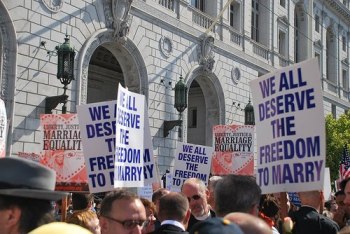
The U.S. 9th Circuit Court of Appeals granted a request by C-SPAN to broadcast the two-hour hearing, which is scheduled to start at 10 a.m. The court said C-SPAN would provide its tape to other broadcast media that receive court permission to televise the hearing.
This hearing is taking place on Dec. 6th, and will involve only arguments made by lawyers for both sides, not testimony by witnesses. The hearing is in response to the Yes on 8’s sides appeal of Judge Walker’s ruling, but the first hour of the proceedings will be devoted to determining whether their side even has the grounds for an appeal. Having the standing to appeal a ruling generally requires that the appellant be directly affected by the ruling – and as was pretty solidly established in the actual trial, the Yes on 8 lawyers are not directly affected by anyone getting married except them, I guess. The second hour will be devoted to whether Prop 8 violates equal protection rights – another major tenet of our case against it in the trial a few months ago.
The exact form of our coverage of this hearing – liveblog? recap? roundup post? – is as yet undetermined, but rest assured that one will happen, so stay tuned and keep your fingers crossed.
We’ll Always Have Prop 8 I Mean Paris: Goodbye, Judge Walker
In a surprise announcement, Judge Vaughn Walker of Prop 8 Trial fame has said that he will retire from the bench at the end of this year. He’s served as chief judge of the Northern District of California since 2004, and is best known for his ruling on the Proposition 8 trial earlier this year. He says that his decision to retire is unrelated to his now-famous ruling, and that more details about his leaving may be released in coming weeks. His letter to President Obama explaining his decision read “Concluding 21 years of judicial service, I leave the bench with the highest respect and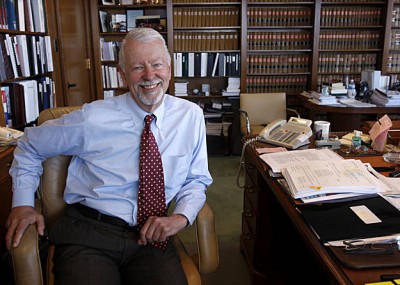 regard for the federal judiciary, its judges and their staff and the essential role they fulfill in our constitutional system.” (@sfchronicle)
regard for the federal judiciary, its judges and their staff and the essential role they fulfill in our constitutional system.” (@sfchronicle)
Walker was nominated as a judge by Ronald Reagan and later by George H.W. Bush; he was never particularly open about his homosexuality, and both presidents would probably have been very surprised to know that he would rule for same-sex marriage in the future. Ironically, Walker was originally perceived as anti-gay, so much so that his nomination to the bench was stalled – he at one point represented the US Olympic Committee against the Gay Games. His other most famous ruling was to declare President George W. Bush’s electronic surveillance program unconstitutional, declaring that federal agents could not intercept phone calls or emails without a court warrant. (@upi)
While we wait for more news on Walker’s retirement in a nailbiting process that bizarrely parallels news on the actual Prop 8 trial, feel free to look back and reflect warmly on some of the brightest shining moments of the 138-page ruling from a man that we who followed the Prop 8 trial came to love dearly. Judge Walker, here’s to you. We wish you many wedding receptions in your future.
Prop 8 Gets its Stay, Gays Won’t Get Married Wednesday, Hate Hate Go Away
 Hey, remember when we told you that you (and here we refer to gay Californians) would be able to marry according to the dictate of your heart and soul starting Wednesday August 18th? Apparently that is a filthy and heartrending lie, because today the Ninth Circuit of Appeals decided to stay Judge Walker’s order regarding the requested stay of marriages, and in fact continue staying those marriages until at least December. (@dallasvoice)
Hey, remember when we told you that you (and here we refer to gay Californians) would be able to marry according to the dictate of your heart and soul starting Wednesday August 18th? Apparently that is a filthy and heartrending lie, because today the Ninth Circuit of Appeals decided to stay Judge Walker’s order regarding the requested stay of marriages, and in fact continue staying those marriages until at least December. (@dallasvoice)
I have zero understanding of why this decision was made or what convolution of the judicial system allowed for it to happen; I had been under the impression that Judge Walker’s decision on a potential stay was final, but clearly I was wrong about that. The light at the end of the dream-crushing tunnel here is at least the appeals court has also ordered that Yes on 8’s appeal of Walker’s decision be addressed on an expedited basis, which means that the next step in this process may come while you still have the mental faculty to understand what’s going on, at least as well as you do now. The court has said it will hear arguments regarding the appeal the week of December 6th, which apparently in court time is practically lightspeed. Unfortunately in real-world time that is PRACTICALLY THE OPPOSITE OF LIGHTSPEED, and devastating to anyone personally affected by this case and the issues involved.
There is at least an argument to be made for a bright side, though. Since all important legal decisions are like a chess game, where doing anything requires planning eighteen steps ahead of your opponent, every move anyone makes has a dozen complex ramifications, and this stay is no exception. According to some, it may end up benefiting us in the long run.
Loyola Law School professor Richard Hasen said Monday’s order was strategically advantageous for supporters of same-sex marriage, no matter how disappointed many couples may be. If the panel had refused to place a hold on Walker’s ruling, the supporters of Proposition 8 were prepared to seek a stay from the Supreme Court. The court is believed to be divided on the question of gay marriage, with Justice Anthony Kennedy considered a swing vote. A vote on a hold might have pushed the justices into taking an early position on the question.
“I think there are strategic reasons why even the most ardent supporter of gay marriage could opt for a stay,” said Hasen, an expert on federal court stays. “The concern is that rushing things to the Supreme Court could lead to an adverse result [for supporters of gay marriage.] If this case takes another year to get to the U.S. Supreme Court, there could be more states that adopt same-sex marriage and more judicial opinions that reach that conclusion.”
(@latimes)
This is kind of related to the point Slate tried to make earlier this week – that while our instinct is to shut this ish down as soon as possible and close the debate before anyone can get a legal foothold that might take away the precious thing that we’ve fought for here, in the long run it might be best to let it run its course. The argument here is that if Prop 8 is appealed again and again, and the appeals hold all the way to the Supreme Court, and we win there, it will be virtually impossible to reverse that decision later. We’ll have won in a much bigger way. Of course, it’s crazy to think that you can honestly tell that to families who have been waiting for this moment with their hearts in their hands – “just wait this one out, it’ll be best for everyone in the long view and there’s definitely a chance you can get legally married by the time your kid graduates high school!” – but since we don’t really have a choice in the matter right now, it’s at least something to hold onto. (@slate)
So we’re back on the ride, it seems, and we won’t be able to stop and get off til it’s over. The best we can do is hold hands and be brave.
Listicle Without Commentary: Headlines Prepared for Losing Prop 8 Trial, or “The Art of Losing Inequality is Not Hard to Master”
Titles Prepared via Group G-Chat Between Rachel, Sarah, Laneia and Riese for Our Post on the Prop 8 Verdict, Which We Assumed We’d Lose
– August 4, 2010
1. Zen and the Art of Losing Your Marriage Rights
2. How to Lose Marriage Rights and Alienate Your Family
3. Problem Drinking, Therapy and Me: Living without Marriage Rights in 2010
4. A Heartbreaking Work of Staggering Inequality
5. The Brief Wondrous Life of Prop 8
6. The Unbearable Inequity of California
7. If You Have to Cry About Losing Your Marriage Rights, Go Outside
8. Life of H8
9. And the Heart Says Whatever Inequality
10. Merriam Webster’s Dictionary of Rights You Don’t Have Cause You’re Gay
11. Are You There, Marriage? It’s Me, Disenfranchised Gay Person
12. The Art of Happiness, Sans Equality
13. Bastard Out of California
14. The Perks of Being a Homosexual
15. Oranges Pretty Much Are The Only Fruit, ‘Cause You’re Not Getting Wedding Cake
16. Twilight: Inequality
17. One Hundred Years of Inequality
18. Equality, Interrupted
19. How I Learned To Stop Worrying And Enjoy Being A Second-Class Citizen
Right after that one, we won.
[“listicle without commentary” title stolen from the awl]
California Governor Arnold Schwarzenegger Loves Gay People, Wants Them Married ASAP
On Friday afternoon something special happened: Gov. Schwarzenegger’s administration filed a brief arguing that no stay should be imposed on Judge Walker’s decision overturning Prop 8 and that gay and lesbian Californians should be permitted to start getting married immediately. Immediately! In droves! Imagine it, lines around the corner, not a tiara left at Claire’s! Get your rice-throwin’ arms warmed up, because it’s about to get NUPTUAL, right?
This action inspired Joe.My.God to say “WOW. The governator has totally done the unexpected!” However, it’s worth noting that throughout his time in office Governor Schwarzenegger has always opposed Proposition 8, going so far as to refuse to defend it in court in the very trial that led to its recent dismantling. But it’s still a Republican Governor expressing a viewpoint contrary to the views of his own party. (Unlike some elected officials who can’t even seem to do anything despite Democratic affiliations.) (HAPPY BELATED BIRTHDAY.)
So what does this mean? As wounded idealists, we’re reluctant to count our chickens regardless of hatching status, but is it possible that actual change is happening, even beyond the courts? Since the ruling, all kinds of people are having all kinds of feelings so, let’s process:
Both American and international GLBT communities and allies responded to G.H.W. Bush-appointed California District Court Judge Vaughn Walker’s ruling by saying “RIGHT ON” and high-fiving each other. But some people hate love/joy/justice, and these people have been granted a stay. They were given until Friday to file arguments for or against the stay, and it’s possible Judge Walker will extend that stay for even longer. Or, he might decide to let the 9th Circuit Court of Appeals order (or not order) a stay, at the behest of the Mean People Who Lost and Will Lose in the Long Run Anyway. But why wait, right? Girlfriends have to make it to the church on time!
Making California Governor/actor/fitness enthusiast Arnold Schwarzenegger’s similar sense of urgency even more interesting, Republican gubernatorial candidate Meg Whitman — an early favorite for Arnold’s upcoming job replacement — issued a statement following Wednesday’s verdict saying that she believes that marriage should be between a man and a woman (psst – even with gay marriage, it still can be! I know right?). Basically Meg Whitman is against gay people, which is much like being against “money” or “Tuesday.”
Whitman is certainly no Fred Phelps — she’s expressed support for civil unions throughout her campaign. But at this point, is that enough to count as “not being against gay people”? If Gov. Schwarzenegger can say “let the gays get married now,” then certainly we can raise the bar a little. It’s not a big deal to let disenfranchised citizens on the bus if they’ve still gotta sit in the back (although the back is the best place to sit if you want to make out on the Greyhound FYI).
Whether or not the Prop 8 ruling and Whitman’s stance on it will have any impact on her campaign is hard to say, but she’s certainly not making any gay friends (which, in California, is like really easy to do), and it’s possible that she could even alienate Republicans who are tired of being assholes.

Representing Incendiary Language Bolstering the Fundamentally Irrational, Whitman’s fans at Focus on the Family are also freaking out about this ruling because now children will learn in school that gay couples are normal! In an email to supporters following Walker’s ruling, Focus on the Family stated that “[t]he Prop 8 verdict . . . is exactly why Christians need to be actively involved in elections at every opportunity” and urged their flock to make their voices heard in the November elections, lest millions of defenseless children everywhere be “deprived of the best chance to have both a mom and a dad”!
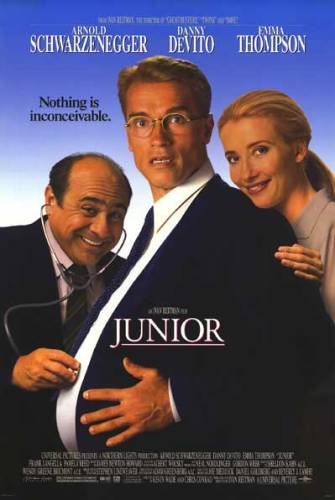
Meanwhile, every gay person’s bestbestfriend Fox News conducted a poll asking viewers what they thought about the Prop 8 ruling, and get this: 71% of respondents said that they agree with Walker’s decision. The Huffington Post asks, “Is it possible that even the center-right tilting viewing audience of Fox news programs is also open to significant upgrades of gay civil rights?” Well? Is it? The HuffPo seems unaware of the gay media’s mobilization around the Fox poll, but even if the poll was swayed by large numbers of flamey gays momentarily discarding their fruity drinks to vote, does that matter to Fox’s partially blind wingnut viewers? Maybe they’ll just see the poll results and be like “oh all my friends like gay people now, so i should too.”
And isn’t that what real change is about? [Tricking the viewers of Fox News’s website? YEAH!] Someone should maybe email someone in the Oval Office and fill them in on what’s happening here. They might want to get in on this.
What do you think? Does Schwarzenegger’s statement mean that things might actually be getting better for gay people in this country? Or does nobody care and he should worry about finding Sarah Connors or something? Leave your best Kindergarten Cop puns (and thoughtful feedback) in the comments!
Judge Walker and the Comeback Kids: How the Gays Beat Prop 8
Judge Walker overturned Prop 8 on Wednesday and so we’ve called in our Legal Beagle Jessica to explain the nuts & bolts to ya. Like wtf is a “stay,” right?
In the past, Jessica has explained what Massachusetts’ ruling on DOMA means, the implications of having Elena Kagan on our supreme court (and now she is! so you should probably read that again) and initially began writing for us during the Prop 8 trial to answer our questions w/r/t How Do We Win This Thing?, What is Equal Protection? as well as basically briefing us on Prop 8 Trial 101.
All photos are from the rally in San Francisco in the Castro District after Prop 8 was overturned on August 4th, 2010.
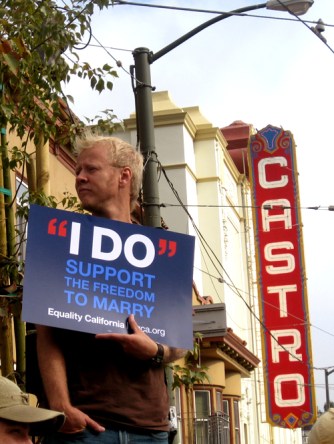
You Might Win Some But You Just Lost One
So what did Judge Walker actually decide? As you may recall, during the Prop 8 trial Team Totally Right was laying the evidentiary groundwork to make three arguments:
1. Proposition 8 violates the fundamental right to marriage as embodied in the due process clause.
2. Proposition 8 violates the equal protection clause because it discriminates based on sex.
3. Proposition 8 violates the equal protection clause because it discriminates based on sexual orientation.
To be invalidated Prop 8 only needs to be unconstitutional for one reason. However, Judge Vaughn Walker found that it is unconstitutional for all of these reasons.
According to Judge Walker, Proposition 8 “unconstitutionally burdens the exercise of the fundamental right to marry and creates an irrational classification on the basis of sexual orientation.” Within his analysis of the equal protection argument, Walker acknowledges that discrimination based on sexual orientation can take the form of discrimination based on sex, but explains that it is ultimately a separate claim.
So although he writes about sexual orientation discrimination, he notes that the arguments would be just as effective if considering the laws with regard to sex discrimination.
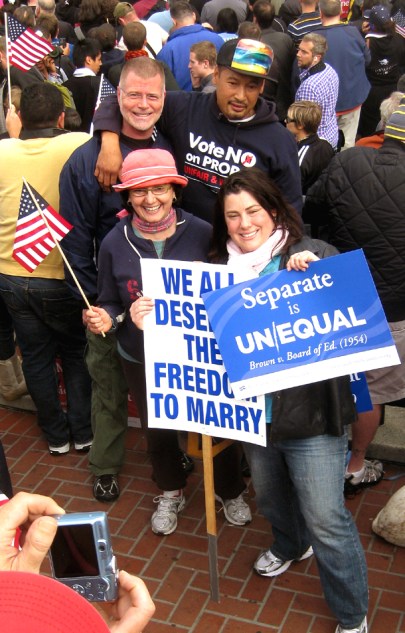
Judge Walker on The Fundamental Right to Marriage
Both sides agree that the right to marriage is fundamental; the dispute on this issue centered upon whether the couples comprising Team Totally Right were simply seeking to exercise this fundamental right or seeking recognition of a new right (by virtue of being same-sex couples).
After considering the essential characteristics of marriage (two people giving their free consent to form a committed relationship, which then forms the foundation of a household wherein the people agree to support each other and their dependents), Judge Walker concludes that marriage is marriage, regardless of the “relative gender composition” of those involved. Team Totally Right is not requesting the recognition of a new right, they just want that old ordinary right to marriage.
Since that old, ordinary right is a fundamental one, any law that burdens that right must be supported by a really good reason — the government must produce evidence that the law is “narrowly tailored to a compelling government interest.” According to Judge Walker, “the minimal evidentiary presentation” made by the H8ers just didn’t cut it. They didn’t demonstrate a compelling government interest in limiting marriage to opposite-sex couples, and in the absence of such a demonstration, Proposition 8 violates the Due Process Clause (which protects fundamental rights). The law must fall.
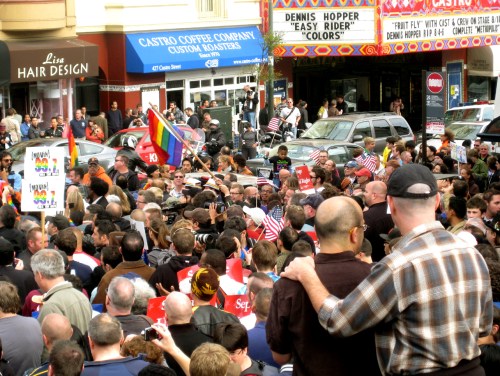
Judge Walker on The Equal Protection Of The Law
Despite its name, the equal protection clause does not require that the laws treat everyone equally. Instead, generally when the government passes a law that treats different people differently, the court presumes that the law is valid and will uphold it as long as the law is rationally related to some legitimate governmental interest. However, when the differing treatment is based upon membership in a “suspect class” (like race or gender) then the law will be scrutinized more closely.
During the trial, Team Totally Right advanced two complementary arguments under the equal protection clause:
1 – Proposition 8 discriminates based on sexual orientation and that sexual orientation is a suspect class warranting some degree of heightened review
2 – Even if the Judge didn’t find sexual orientation to be a suspect class warranting heightened scrutiny, Proposition 8 discriminates based on sex, and laws that discriminate based on sex are subject to heightened scrutiny
Judge Walker agrees on all points. He finds that “sexual orientation discrimination can take the form of sex discrimination” and that the two are inherently interrelated, but that sex discrimination is only one component of sexual orientation discrimination. Because Proposition 8 only eliminates the rights gays and lesbians seek to exercise, he makes the ruling based on sexual orientation discrimination, but notes that the claim is “equivalent to a claim of discrimination based on sex.”
Walker explains that the evidence presented at trial demonstrates that gays and lesbians are the type of minority that strict scrutiny review intends to protect. Among other things, he references the fact that sexual orientation is immutable and not generally something people choose, gays and lesbians have faced a long history of discrimination, discrimination still exists, irrational stereotypes persist and these stereotypes have resulted in social and legal disadvantages.
Ultimately, however, he finds that the arguments for heightened scrutiny are unnecessary, because Prop 8 cannot pass even the lowest level of review, rational basis. “Excluding same-sex couples from marriage is simply not rationally related to a legitimate governmental interest.” The H8ers claim six “legitimate” interests; Judge Walker doesn’t accept any of them. Again, without any legitimate governmental interest, the law cannot stand.
In a conclusion that might make your heart weep with joy and warrants reading even if you’ve already seen it, Judge Walker succinctly explains:
“Proposition 8 fails to advance any rational basis in singling out gay men and lesbians for denial of a marriage license. Indeed, the evidence shows Proposition 8 does nothing more than enshrine in the California Constitution the notion that opposite-sex couples are superior to same-sex couples. Because California has no interest in discriminating against gay men and lesbians, and because Proposition 8 prevents California from fulfilling its constitutional obligation to provide marriages on an equal basis, the court concludes that Proposition 8 is unconstitutional.”

If I Gave You Peaches Out of My Own Garden and I Made You a Peach Pie
So you’re a rockstar reader and already knew all of that? Good job. Gold stars for you. Those are just the highlights of the opinion, though. The true legal story goes a bit deeper. Beyond the actual words of the opinion (which are admittedly awesome), there are two aspects of the opinion that make it especially special.
First, conventional wisdom suggests that any decision on the matter at the Supreme Court will come down to the opinion of Justice Anthony Kennedy. This may or may not be true, but presumably, Chief Justice Roberts and Justices Scalia, Thomas and Alito will be against us, while Justices Ginsburg, Sotomayor, Breyer and Kagan(!) will automatically be on our side. We’ll need five Justices, though, so all eyes are on Justice Kennedy. As Dahlia Lithwick of Slate explained it, the opinion reads a little like a love letter to Justice Kennedy. Walker quotes liberally from Romer v. Evans and Lawrence v. Texas, two opinions Justice Kennedy authored. He focuses on the importance of liberty, a concept that some have suggested sits at the center of Justice Kennedy’s jurisprudence. The opinion was clearly written with the knowledge that the decision may come down to Kennedy’s opinion.
That said, conventional wisdom about the Supreme Court is sometimes wrong. Judge Walker also quotes from Justice Scalia’s dissenting opinion in Lawrence, where Scalia noted that “If moral disapprobation of homosexual conduct is ‘no legitimate state interest’ for purposes of proscribing that conduct what justification could there possibly be for denying the benefits of marriage to homosexual couples exercising ‘the liberty protected by the Constitution’?” As Lawrence established that moral disapproval of an act is insufficient to warrant upholding a law prohibiting the practice, perhaps Scalia is just waiting to cast his vote in favor of the gays. It could happen. [It won’t happen.]
Second, it’s worth noting Judge Walker’s clear, strategic divisions between findings of fact and conclusions of law. Walker wrote this opinion with the intention that it withstand review.
When an appellate court reviews the decision of a lower court, the lower court’s legal conclusions are given essentially no deference. However, the factual findings are given significant deference; an appellate court can only set aside a factual determination if the factual determination is clearly erroneous. The credibility findings are subject to even higher deference.
Knowing this, Judge Walker created an incredibly detailed factual record, featuring 80 distinct findings of fact. Among other things, he noted the following:
+ Permitting same-sex couples to marry will not affect the number of opposite-sex couples who marry, divorce, cohabit, have children or otherwise affect the stability of opposite-sex marriage.
+ Individuals do not generally choose their sexual orientation.
+ Sexual orientation is fundamental to a person’s identity and is a distinguishing characteristic that defines gays and lesbians as a discrete group
+ Prop 8 places the force of law behind stigmas against gays and lesbians, including that gays and lesbians do not have intimate relationships similar to heterosexual couples, gays and lesbians are not as good as heterosexuals, and gay and lesbian relationships do not deserve the full recognition of society.
The appellate court will be required to contend with these meticulously crafted factual findings. With such a pointed factual record, the appellate court will likely find it difficult to reach legal conclusions contrary to those of Judge Walker. This is not to suggest that the decision can never be overturned on appeal. It can and it very well might be. Judge Walker has done everything that he can to ensure that it won’t be, though.
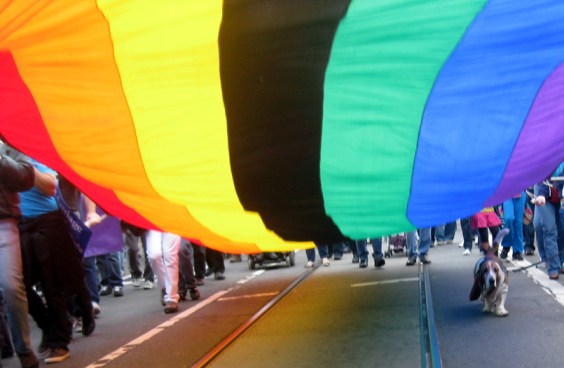
What Happens Now?
Before the opinion was released the H8ers filed a motion to stay the judgment. Essentially, they requested that the effect of the ruling be put on hold until the Ninth Circuit has a chance to rule on the case. After releasing the opinion on Wednesday, Judge Walker granted a temporary stay, giving Team Totally Right time to respond to the H8ers request. He’ll make a final decision on the longer-term viability of the stay early next week.
Even if Walker chooses not to grant the stay, he will likely give the H8ers time to request an emergency stay from the Ninth Circuit. In essence, this means that the H8ers have several opportunities to prevent marriages from resuming immediately.
While this issue is being resolved, though, the H8ers are already looking forward to the next round. On Wednesday, they filed a Notice of Appeal. One more reminder that, although this was certainly a victory for Team Totally Right, it is but a step in the process and we still have a long way to go.
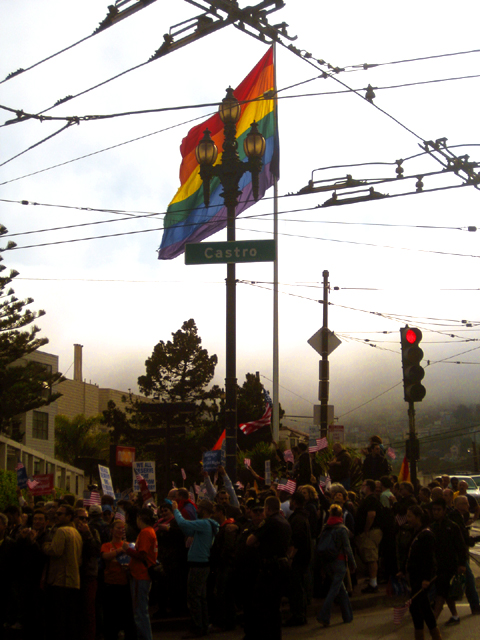
Prop 8 Overturned: Top 10 Smackdowns & Affirmations From Judge Walker’s 138-Page Decision
WELCOME TO THE POST-PROP-8-REPEAL WORLD. Are you married yet? No you’re not, because weddings won’t start til at least next week, maybe later depending on whether Judge Walker agrees to issue a stay on the ruling. But that’s okay, almost, because it means you have plenty of time to peruse the 138-page PDF of Judge Walker’s full decision! I mean, you should prepare for later today when our favorite Legal Eagle will have a full post for you explaining what happens next.
This may not sound convincing coming from the person who sunk literally days into recapping every day of the trial while it was happening, but um, it’s actually a really good read? It doesn’t take as long as you would think, and it’s double-spaced! But if you have better things do do, like celebratory fingerblasting, we understand.
But, just so you know, Rachel Maddow read the whole thing and REALLY LOVED IT: “I kid you not, is better than whatever novel you are currently reading and you should print it out and curl up with it instead, you will not be disappointed. It’s on the internet!”
I’ve picked out my top ten personal favorite moments from the full document, the ones that go the farthest towards repairing the psychological and emotional damage that the Yes on 8 campaign did to me as a person. There are actually a dizzying number of passages that made me want to do jazz hands or create origami flowers or sprinkle glitter on things because they made my heart so happy – like honestly just the Word document that I copy/pasted parts into is at least 12 pages long – but these are special, these are like poetry. Like spoken word poetry performed by a pretty girl who plays acoustic guitar in a coffeeshop who you will later take home, and possibly even marry because YOU CAN DO THAT NOW. Anyways. Here are some words in a list.
1. The Homosexual Heart Sparkles Award:

In case you had somehow forgotten why we were doing this.
2. The Team Totally Right Award:

Because we’re not just pretty faces – our experts were hot shit, and we’re glad that someone noticed.
3. The Team Totally Wrong Awards:
The only thing that got us through the hot hyperventilating self-medicating mess of the h8ers’ “expert witnesses” was the hope that maybe, someday, we would have confirmation from an objective third party that they were completely insane. Now that day has come, and maybe tonight we can sleep soundly without the Ambien even!
On Hak-Shing William Tam:
David Boies (B): You say here that if we lose Prop. 8 “they” will lose no time to push the gay agenda?
William Tam: Yes. They will.
David Boies: You said that you thought Prop. 8 would lead to legalizing prostitution. Why?
Tam: Measure K in San Francisco. I saw some homosexuals hanging around there.
Boies: You know that Measure K has nothing to do with Prop. 8.
Tam: Yes.
Boies: You told people that after Prop 8, legalizing sex with children will be next. That’s the homosexual agenda. Do you believe this?
Tam: Yes.
Boies: You said that if Prop. 8 passes, California will fall into Satan’s hands.
Tam: Yes, I said that.
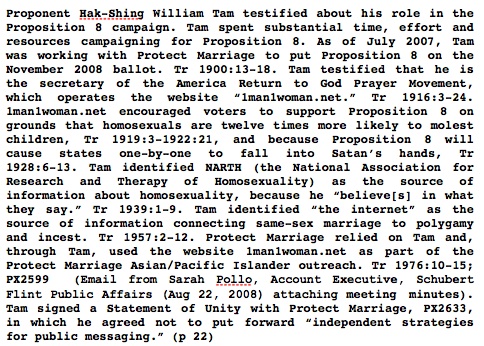
On David Blankenhorn:
“Most people have to pay for therapy to talk about their feelings this much!” – Day 12 of the Prop 8 Recaps


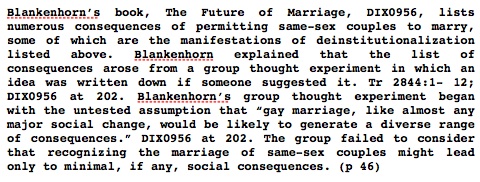

On Kenneth Miller:
“Astoundingly, Miller seems to be aware that DOMA is still in effect, and admits that he “would guess that the majority of the LGBT community would like that repealed.” Finger on the pulse, that one… I almost just stood up and applauded. It’s like he’s finally potty-trained.” — Day 10 of the Prop 8 Recaps

4. The Mormon Proposition Award:

The Church of Latter-Day Saints: Protecting The Sanctity of Marriage Ever Since 1878 When Polygamy Became Illegal
5. The Okay Just The Way You Are Award:
The constant insidious suggestions that being gay is, you know, MADE UP, and wanting to marry someone of the same sex is an unfortunate side effect of not being able to just man up and enjoy a nice dick once in a while brought us traumatic flashbacks of coming out to our parents and made us want to set someone’s house on fire. But no fear, because Judge Walker wants the world to know that that shit is wack.
“Women have historically had many, many fewer choices in a lot of arenas, and sexuality is definitely one of them. When you say our sexuality is “affected by environmental factors,” do you just mean that a lot of decisions about our sexuality are made for us, depending on the environment we’re in? Like, depending on the part of the world you live in, you might very well be “straight” because you have to get married, and you have to marry a man.” –– Day 9 of the Prop 8 Recaps
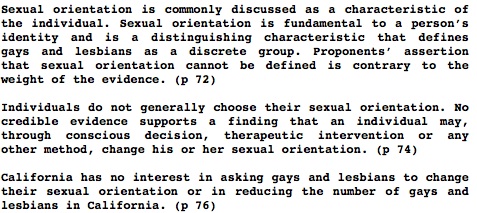
6. The There’s Nothing Under The Bed Award:
After approximately eleven million months of ultraconservative paranoia attacks that our gay AIDS heroin-addicted feminazi communist virus is somehow going to get into the water, it actually almost brings us to tears to see someone in a position of power calmly and authoritatively refute the crazy myths that surrounded this case.
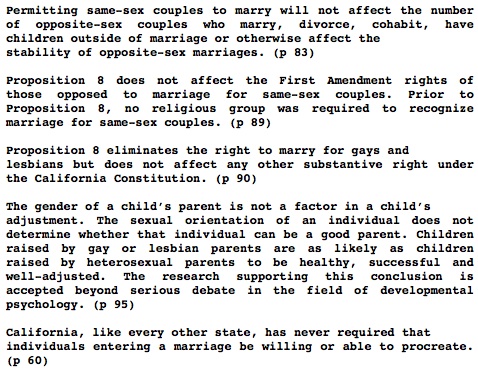
7. The I Dunno, This Just Made Me Feel Really Good Award:
After having it relentlessly pounded into all of our head that outlawing gay marriage is the only way to save the helpless naked infants of the world, it’s actually an enormous relief to have someone affirm that getting married is about, I dunno, the people getting married? The effect of the crazy sociopolitical Values Circus surrounding this issue succeeds in making it about everyone except the people it’s actually about – gay marriage is about the children, about the Pope, about imaginary princesses, about hypothetical polygamous societies in nameless African countries, but never about the people who want to get married. Except sometimes there’s a tiny clause in a legal decision that reminds you it is, and it’s so affirming you have to sit down and do some deep breathing, maybe call your mom and talk it out later.

8. The Best Section Heading In History Award:

9. The I Feel So Fucking Validated Right Now Award:
Hey you! Yes, you there! Do you frequently feel disenfranchised and mistreated by your own government and the people of your country? Has the phrase “second-class citizen” ever really resonated with you? Do you constantly experience prejudice and both individual and systemic discrimination because of your sexual orientation, gender identity or gender presentation, but have trouble getting people to sympathize with or even believe your experiences? MAYBE YOU WOULD LIKE TO SEE A LEGAL DOCUMENT THAT AFFIRMS YOUR FEELINGS, WITH ELEVEN DIFFERENT CLAUSES OF SUPPORTING EVIDENCE.
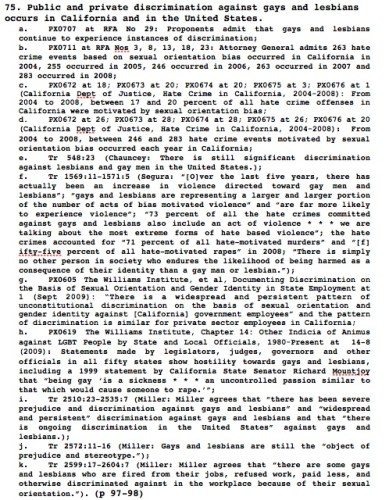
10. THE MONEY SHOT
